












Local Catholics are hoping a multi-denominational Christian movement due to hit Perth in 2007 will help bring the young back to the Church.
About 100 evangelists and missionaries from around the world will converge in Perth in February and March 2007 for the event known as the Impact World Tour and will address young people in schools and conduct evangelising meetings in large public venues.
Perth is spiritually ripe for revival, IWT’s world head Mark Anderson told over 100 Christian leaders at gath-
erings in Mt Hawthorn and Booragoon in late October.
IWT is an interdenominational movement particularly dedicated to presenting the Gospel to young people.
Mr Anderson is IWT’s International Director and was in Perth to prepare church leaders, pastors and others for laying the groundwork of the 2007 campaign.
The event will also be staged in the Geraldton region in February 2006.
The tour is conducted over a seven-week period and is designed to bring the power and relevance of the Gospel of Jesus Christ to today’s youth in an exciting and contempo-
rary way. The Gospel messages of love, life and freedom will be conveyed through music, dance, extreme sports and entertainment in a way that will attract and challenge the youth of Perth.
Mr Anderson said he had been evangelising throughout the world for 29 years and has sensed in several recent trips to Perth that the city is on the brink of a revival.
He has seen thousands of young people dedicate their lives to Christ through IWT in campaigns conducted in the US, South America, India, New Zealand and other places.
IWT plans to work hand in hand with local churches of all
denominations so that discipleship can continue after the campaign.
Kaye Rollings of Flame Ministries International, the Catholic representative on IWT Board of Reference in Perth, said “We are anticipating that many Catholics who have fallen away will come back to the Church as a result of this campaign.” She is encouraging as many Catholics as possible to become involved, especially Youth Leaders, as converts from the event will be directed to their local parishes for ongoing formation.
For further information on IWT contact Kaye Rollings on (08) 9382 3668.
Scientists, ethicists say water is key
VATICAN CITY (CNS) - If modern wars are sometimes fought over oil, future conflicts may arise over an even more essential resource: water. That’s the concern of a group of scientists and ethicists who met from November 12-14 at the Vatican to discuss “Water and the Environment.” The meeting was the first effort of the Pontifical Academy of Sciences to address an issue that has important environmental, political, economic and health consequences for all humanity.
“In many parts of the world, there is not a real abundance of water. Furthermore, human impact is changing the biosphere and the composition of the atmosphere, which will have repercussions on the availability of water in the future,” said Paul Crutzen, a Dutch chemist who won a Nobel Prize in 1995 for his study of the ozone layer of the atmosphere. Already, experts estimate that more than 1 billion people around the world lack access to adequate drinking water.
Continued from page 1
Although Heritage Council approval was not strictly required under Section 78 (5) of the Heritage Act, the Archdiocese made a presentation to the Heritage Council and sought its views. The develop-
ment committee of HCWA accepted the liturgical reasons for removal of portion of the 1865 building and supported the proposed development. It also proposed various conditions that will be dealt with in final planning.
Architect Peter Quinn said that
Archbishop Hickey described the Council vote as “welcome news.”
“It comes at the end of protracted but important discussions with the Heritage Council of WA about the project,” he said on Wednesday.
“Together we had to be sure that we could achieve increased seating capacity, better management for the Sacred Liturgy and a ‘complete’ Cathedral while preserving as much as possible of the original fabric of the 1865 Cathedral.
“This has been achieved.
“Now we are able to move ahead rapidly with the detailed drawings in order to sign contracts for the work to begin.
“Most people have found the plan for the completed Cathedral to be elegant and aesthetically pleasing.
“We now look forward to the commencement of the work.”
The
completion of final design work and a proper construction program could see work commence in the second half of next year.
The cathedral as it stands today consists of part of the original 1865 building, with the porch and tower added in 1909, and the eastern end which was built in 1930.
It was planned that the 1930 cathedral would completely replace the old one, but it could not be completed at the time and the two were joined in an amalgam which has never been considered satisfactory architecturally, aesthetically, or liturgically.
In 2003, the Archdiocese invited four experienced Church architects to submit designs to give the city a complete cathedral.
The designs were revealed in December 2003 and were displayed in a number of parishes so that people could express their preferences.
In April 2004, Archbishop
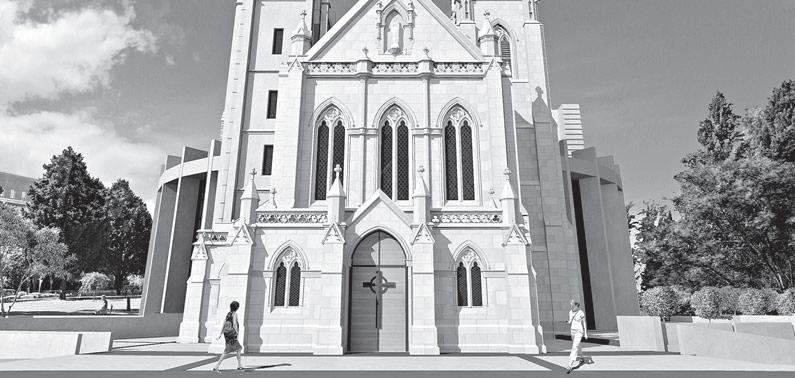
Hickey announced the Peter Quinn design as the preference of both the cathedral selection committee and the general public.
More detailed design work and negotiations with State authorities and the Perth City Council have been continuing since then.
The new building will retain all of the 1930 building designed by Michael Cavanagh, with some changes in use, and the western front and tower of the 1865 build-
ing. The two will be linked by a modern structure which will give a suitable completion to the Cavanagh building.
The new building will provide grater seating capacity and better sight and sound for the congregation.
There will also be new parish facilities and a crypt underneath the cathedral, and greater parking. The landscaped surrounds will be retained.
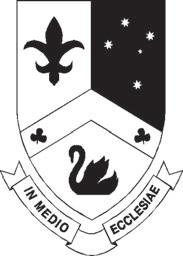
EDITOR PETERROSENGREN Lettersto:cathrec@iinet.net.au
JOURNALISTS JAMIEO'BRIEN jamieob@therecord.com.au
BRONWENCLUNE clune@therecord.com.au
MARKREIDY reidyrec@iinet.net.au
OFFICE
CAROLMCMILLEN administration@therecord.com.au inc.sales/subscriptions
advertising@therecord.com.au
PRODUCTION



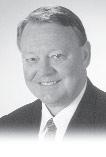
Fax:(08)92277087
TheRecordisaweeklypublicationdistributedthroughparishesofthe
Tense opposition between the Catholic Church and the Federal Government over changes to Australian employment laws hardened this week, as hundreds of thousands of people joined street demonstrations against the changes.
At issue in the dispute between the Church and the Government was the family. Two diametrically opposite views of how the family can best be protected have emerged from the week’s troubles.
Federal Workplace Relations Minister Kevin Andrews, a Catholic who won widespread respect for his successful campaign to defeat the legalisation of euthanasia in 1997, says the Government’s new employment laws will be good for families because they will lead to a stronger economy and more jobs.
But Mr Andrews now finds himself under siege from prominent critics within the Church and the broader community over his support of the changes.
In an interview with The Record, Bishop Kevin Manning of the Parramatta diocese spoke of his respect for Mr Andrews, but questioned the Minister’s ability to reverse a Federal Government policy he described as “very much a concern” for Catholics.
Mr Andrews has continually reiterated the Government’s argument that the changes will create new jobs by giving more incentives to employers to take people on. “The best thing we can do for families is have a strong economy,” he has said.
Bishop Manning countered Mr
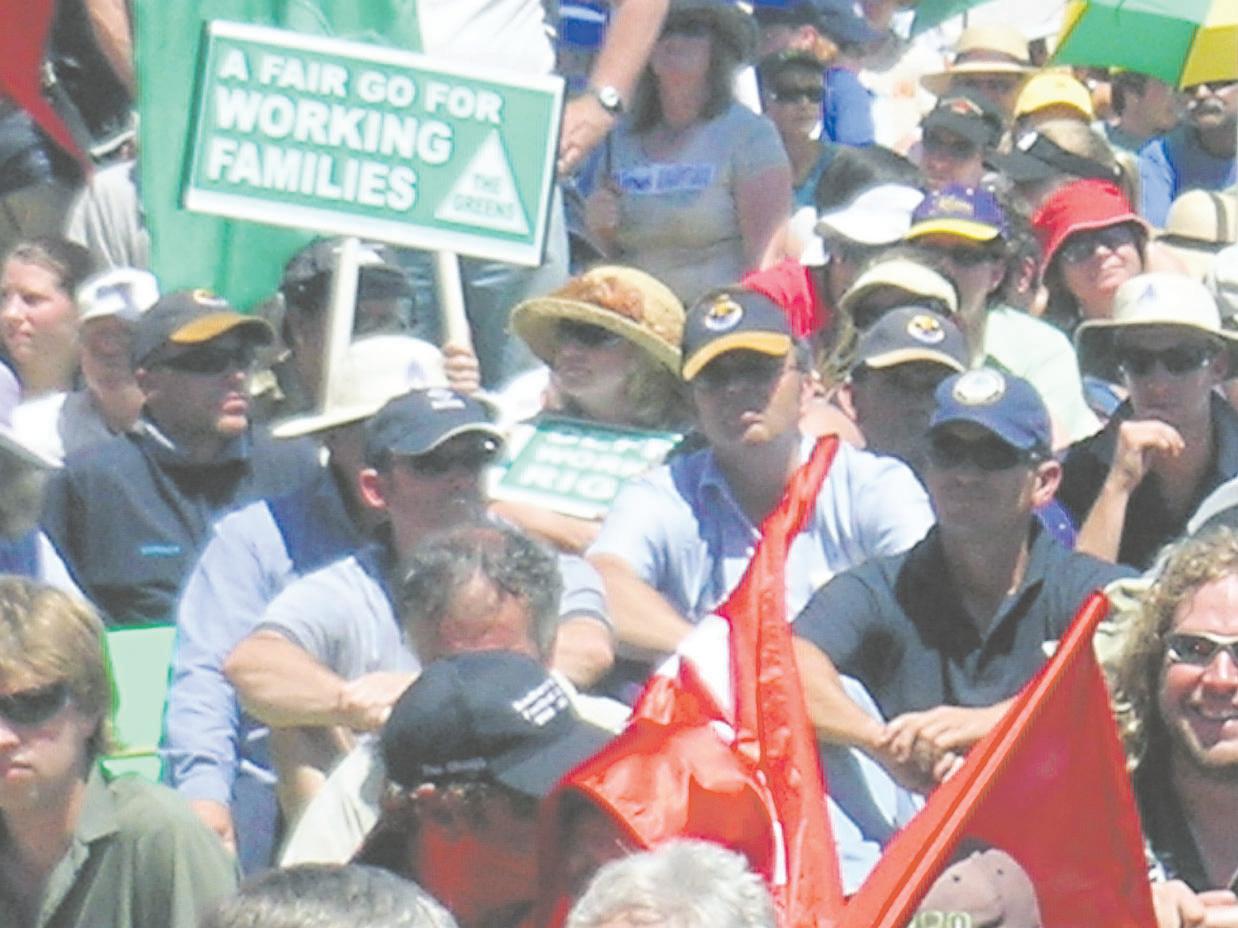
Andrews’ arguments this week in an interview which stressed the opposition between the Government’s proposals, on one hand, and Catholic social teaching, as expressed in the key Church teaching documents Rerum Novarum and John Paul II’s Centesimo Anno, on the other.
According to the Church, human beings “are co-workers with Christ. With the dignity that man has, noone has the right just to use human beings as commodities, which I’m
afraid is what this legislation is going to bring about.”
Bishop Manning also slammed the payment of exorbitant salaries to business leaders. “Five thousand dollars a day for certain people, when other people are trying to live on something like $460 or less, a week, with children. It’s just sinful.”
Bishop Manning’s comments received indirect support from former Prime Minister Paul Keating, who argued in a recent newspa-
per commentary that if minimum wages under the new system fell to $10 an hour – an outcome he predicted as likely, over time – then the Government’s goal of increased employment would become meaningless.
“If you can only score $10 an hour it does not matter how many jobs there are. Forty hours at $10 means you can only earn a maximum of $400 a week – not enough
Continued on Page 7
Catholic organisations including the St Vincent de Paul Society and Young Christian Workers have criticised the Government’s planned changes to social welfare administration and work laws, highlighting the plight of people in low-paid jobs, their children and new workers entering the workforce.
“The most vulnerable members of the community will be pushed off social security and into low-paid jobs that will be offered on the proviso that an Australian Workplace Agreement be accepted, even if that Agreement results in a lowering of real income,” St Vincent de Paul National President John Meahan said in a letter to Federal MPs.
The YCW said it was concerned that young workers will be in a poor bargaining position, and would be vulnerable in a deregulated labour market.
“Through our work we are given a chance to unite with God and with all the workers of our world to serve each other and improve the reality of all human beings,” it said in a comment on the Federal Government’s reforms.

Love, trust and understanding are the keys to a long marriage according to a Beechboro couple who recently celebrated 60 years of marriage.
Barney and Sheila McCarthy from Good Shepherd Parish Lockridge were married on October 28, 1945 on the feast of Christ the King and at Christ the King Church Calcutta.
The couple have nine children, 27 grandchildren and six greatgrandchildren.
They met in 1942, during World War II through mutual relatives when Mr McCarthy, from Agra, had just finished high school and was studying Political Science at St Joseph’s College, Calcutta while Mrs McCarthy was working for Bangalore Telephone Company.
Mrs McCarthy (nee Lesley) was staying with her cousin in Calcutta, who was married to Mr McCarthy’s brother. After three years the couple married in 1945.
Mr McCarthy said for him it was love at first sight.
The couple went on to say that
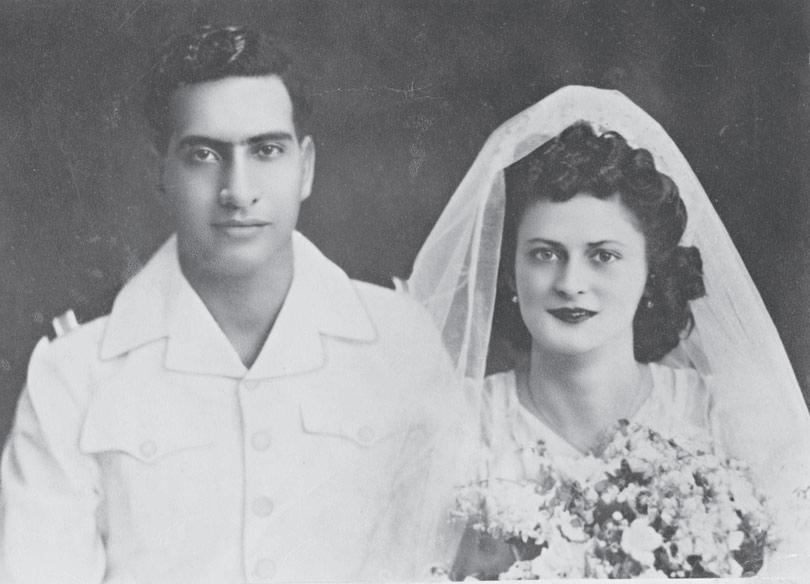
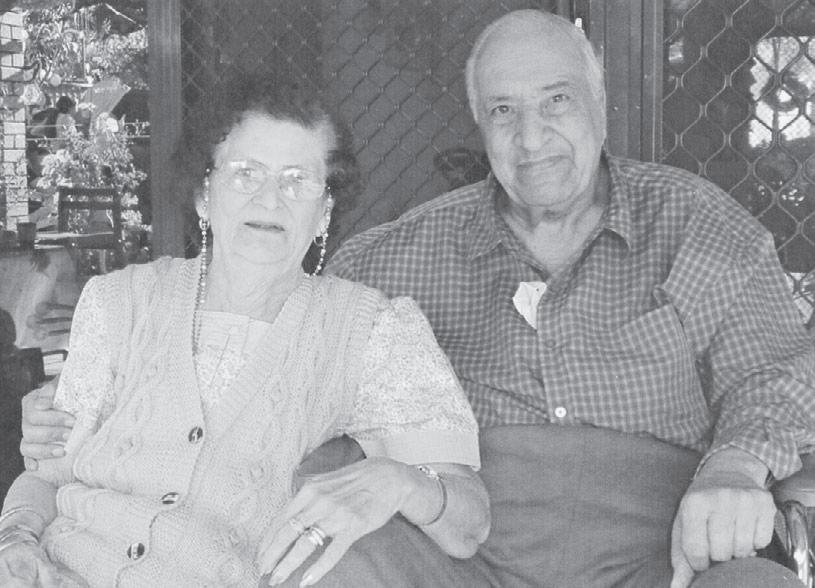
many couples today do not make an effort in their marriage.
“For us there was no such thing as ‘yours’ or ‘mine’,” Mrs McCarthy said.
“It was ‘ours’.”
“Couples today look for the first opportunity to divorce, and the ones who suffer are the children,” she said.
Mr and Mrs McCarthy said they
always tried to keep their differences away from the children.
“There are things I like that she doesn’t and vice versa,” Mr McCarthy said.
“But we have had to learn to accommodate each other.”
After getting married, Mr McCarthy worked as a teacher with the Christian Brothers in Bihar, India.
The couple’s first child, a girl, was born the following year in 1946 and they migrated to then East Pakistan (now Bangladesh) in 1951.
After moving to Karachi, (then) West Pakistan in 1971 because of political unrest, the couple migrated to Australia in 1984 because they believed there would be better opportunities for their children.
One of their sons had already
moved to Perth when he joined the army. Mrs McCarthy remembers arriving in Australia was at first a bit of a strain.
Three of their children still live in Karachi, Pakistan, another two live in Malaysia while the other three boys and one girl live in Perth.
The couple celebrated their 60th anniversary with Mass and a family gathering.
New statement calls for rejection of ‘illusion’ of death penalty
Anew statement on the death penalty that calls on society to “reject the tragic illusion that we can demonstrate respect for life by taking life,” was approved by the US Catholic bishops on November 15 in a nearly unanimous vote.
The statement, “A Culture of Life and the Penalty of Death,” builds upon the 1980 statement by the bishops that called for the abolition of capital punishment.
As Bishop Nicholas DiMarzio of Brooklyn, New York, chairman of the Committee on Domestic Policy, explained as he presented it for a
Join Pope Benedict XVI in prayerNovember
“For married people: may they grow in holiness in everyday life following the example of so many Christian spouses.”
Mission intention: “For Bishops in missionary territories: may they fulfill their duty to provide permanent formation for their priests.”
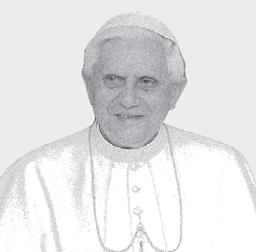
vote, “While this statement represents a major step forward for us as a body of bishops, it does not represent new teaching.”
Instead, it uses recent teaching included in the “Catechism of the Catholic Church,” the Social Doctrine Compendium and Pope John Paul II’s encyclical, “Evangelium Vitae” (“The Gospel of Life”), to express the bishops’ commitment to “restrict, restrain and bring an end to the use of this ultimate penalty because it is deeply flawed and often unfair, and because we have other, better ways to protect society which are more respectful of human life and dignity,” he said.
Bishop DiMarzio said the death penalty “arouses deep passions and diverse views,” and that the Church’s teachings on it “can be oversimpli-
fied, misused or ignored.” He noted that the new statement is the product of three different committees and staff offices and incorporates the perspectives of the bishops’ prolife doctrine and domestic policy committees.
He noted that during a workshop two days before, bishops heard from people with personal experience of the death penalty - the survivour of murder victims, the brother of a convicted killer and someone wrongfully sentenced to death. Those people “turned their loss and suffering into a compelling witness for life, all life,” Bishop DiMarzio said.
Similar stories can be heard around the country, in families “for whom violent crime and the death penalty are not issues or causes,
but sources of deep pain and heartbreak,” he continued. “We must reach out to them, to support and comfort, to care and stand with them. The death penalty offers a false path to healing and wholeness.”
The statement opens by referencing the bishops’ 1980 statement and saying they are renewing their call to end the death penalty now “to seize a new moment and new momentum.”
The United States should stop using the death penalty for four reasons, it says:
- Other ways exist to punish criminals and protect society.
- The application of capital punishment is “deeply flawed and can be irreversibly wrong, is prone to errors and is biased by factors such

as race, the quality of legal representation and where the crime was committed.”
- State-sanctioned killing diminishes all people.
- The penalty of execution undermines respect for human life and dignity.
“We renew our common conviction that it is time for our nation to abandon the illusion that we can protect life by taking life,” it says. “We encourage reflection and call for common action in the Catholic community and among all men and women of good will to end the use of the death penalty in our land. Ending the death penalty would be one important step away from a culture of death toward building a culture of life.”
- CNS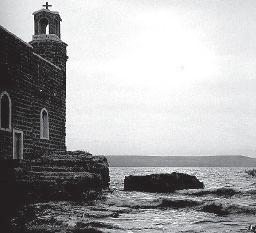

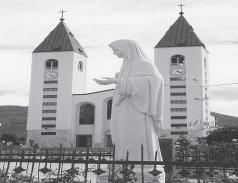
With Christmas on its way, the St Vincent De Paul Society is getting ready to assist those who find the festive season a burden.
The St Vincent de Paul Society made the call to all West Australians last week at a special ceremony in the Government House Gardens.
Archbishop Hickey was present for the occasion, and gave the appeal his blessing.
The Society is this year aiming to raise $500,000.
Funds raised will go towards helping those in need at Christmas and the New Year,
Anticipating the generosity for which West Australians are famous, St Vinnies is hoping the funds will suffice over Christmas and into the New Year when back-to-school costs kick in.
This year, there will be a special focus on the plight of young people living in disadvantaged situations.
National President of St Vincent de Paul Society John Meahan says
while the majority of us are tucking into our turkey and opening the presents at Christmas, for others it’s a vastly different story. “Christmas can be a time of great loneliness and stress for so many West Australians,” said Mr Meahan.
“Many families who are struggling often don’t have the resources to put any food at all on the table, let alone lay out the traditional trappings of the festive season the rest of us take for granted.”
This year, St Vincent de Paul in WA will distribute 7,500 hampers and 20,000 gifts to those who would otherwise not be able to make ends meet.
Archbishop Hickey reminded the crowd that even the first Christmas family needed a little help.
“It may be more than two thousand years on, but Mary and Joseph’s story has a distinct echo in this the 21st century,” the Archbishop said.
“Families still call out for help and rely on the generosity of strangers to offer comfort and support.”
To donate to this year’s St Vincent de Paul Society Christmas Appeal, the community can call 13 18 12 or visit www.vinnies.org.au.
100% of every dollar donated will be used to help people in need.
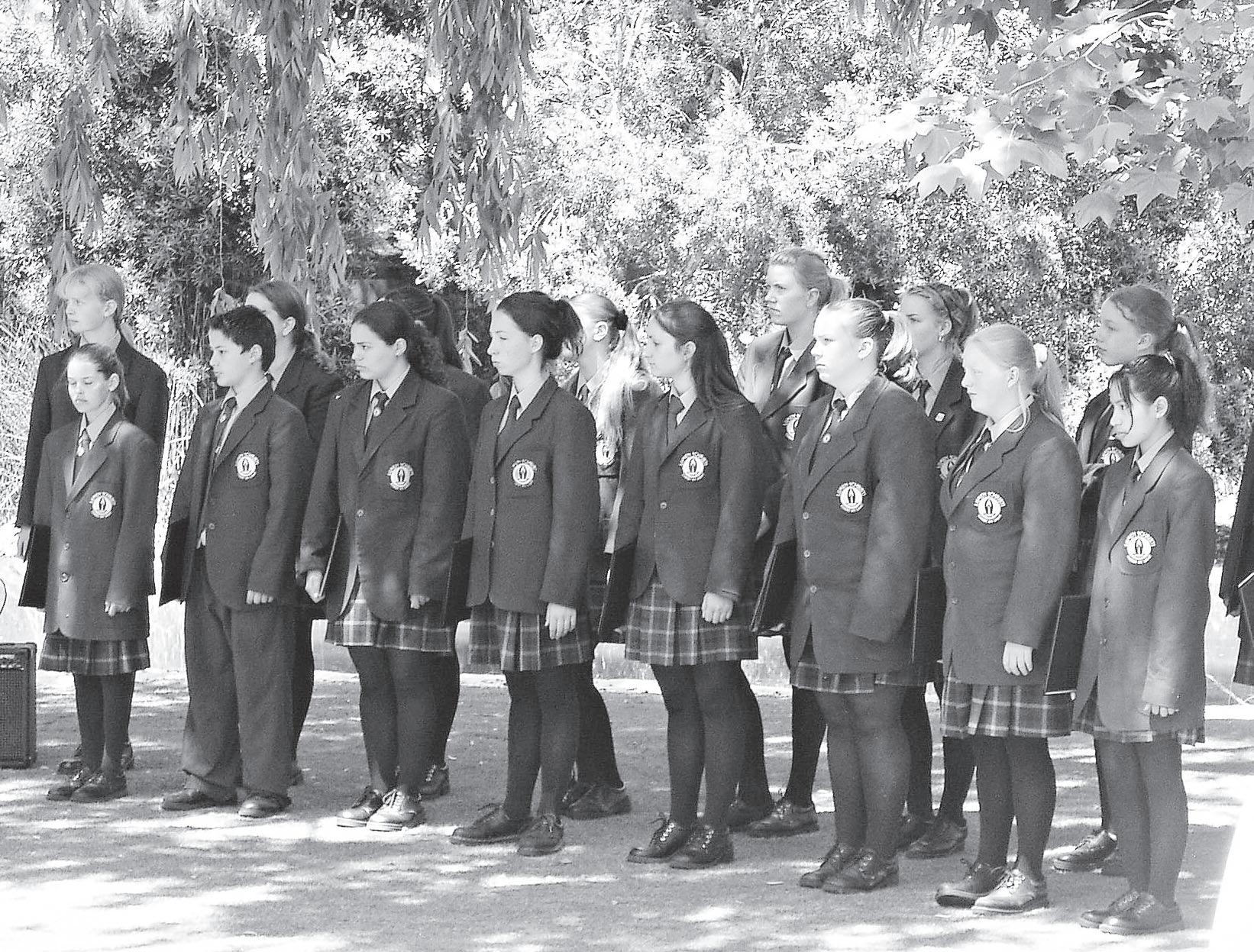
A British cardinal congratulated a Catholic woman for giving birth nearly seven months after she was severely paralyzed in an unprovoked knife attack.
On November 11, Abigail Witchalls, 26, gave birth naturally to her second son at London’s St George’s Hospital. Within three days, the former part-time teacher from Surrey, England, had already begun to breast-feed the 5-pound, 6-ounce baby named Dominic, who was born five weeks premature.
Cardinal Cormac MurphyO’Connor of Westminster sent Witchalls and her husband, Benoit, 27, his “warmest congratulations” in a letter on November 14. “Abigail,
you have been an inspiration for so many people,” the Cardinal said. “May the Lord Jesus sustain you, give you his grace and consolation in your trials and may your mutual love grow stronger and deeper.”
The Cardinal said the baby was a “Gospel-maker” because he was the bearer of good news.
Witchalls was stabbed in the neck on April 20 while pushing her 21-month-old son, Joseph, in his buggy. Doctors expected her to die and she was given the last rites of the Church. She was 10 weeks pregnant at the time.
Bruno Witchalls, her brother-inlaw and a seminarian at Rome’s English College, prayed before the tomb of Pope John Paul II that Abigail Witchalls be healed through the late Pope’s intercession. Within
a week of the attack, she was able to communicate using facial expressions. She was discharged from the hospital on November 3, able to speak, move her arm and hand, and sit upright in a wheelchair. She gave birth naturally because the injuries did not affect the ability of her womb to contract. In a statement on November 13 the family said she would be in the hospital for several days, then return home to live with her family.
In the same statement, the new mother said, “I’ve found great strength and comfort in carrying this child over the past few months, and it is such a blessing and a joy to now finally see him face to face.”
The prime suspect of the attack committed suicide three weeks afterward. - CNS
A n insight into the extraordinary world of the Lismore Catholic Carmelite Nuns
ABC Radio National 820AM in Perth, Wednesday, November 23 10.15am, repeated on Saturday, November 26 at 5.30pm
Forty-two years ago, Sister Johanna of the Cross sensed a special calling from God. She believed she had received a ‘gift’ and in order to respond to that gift she joined the secluded Order of the Carmelite Nuns.
At the age of just 20, she promised to live by the Orders’ three vows of chastity, poverty and obedience. Since then, Sister Johanna’s days have focused on prayer and daily acts of reparation for all souls. Few have heard of the
Lismore Carmelite Nuns and even fewer have visited the inhabitants who reside behind the convent’s closed walls. It is rare that the Sisters speak out loud to each other; they obey an unofficial vow of silence instead. In God Knows
Why Sister Johanna speaks openly to her niece, ABC Radio National producer Julie Kimberley, about her life since joining the Order and the distinct ‘signs’ she recognised as her calling to enter the Order. She also takes us through her disciplined daily routine of prayer.
Sister Johanna’s brother, Denver Lawson, and her younger sister, Maryanne Knoblanche, also speak frankly about the day she left the family circle and the outside world for a life-long commitment to her faith and the Church. Sister Johanna’s decision meant immediate exclusion from all things nor-
mal in daily life and visits to their sister were to be forever through steel bars.
‘How I must have hurt my mother and father, I was so taken up with entering. I was in love with Our Lord and I only had one ambition, which was to give myself to God.’ Sister Johanna.
At first, Denver tried desperately to dissuade his sister from entering the Order and he still finds her decision hard to fathom.
While Maryanne understands that Janny has always had a deep religious belief and accepted her sister’s choice early on she sometimes feels sad for the loss of the family connection. In God Knows Why, we are offered a rare insight into a family and how a decision of one family member has in many ways moulded and influenced the rest of their family life.
The Convent of Mercy, Victoria Square, was built in 1868. It has been a place rich in prayer and service for the community of Perth for more than 150 years.
The Sisters of Mercy are assessing the current use and future development of the Victoria Square Convent. They are looking for expressions of interest in a part-time Project Officer position.
Applications to: The Secretary
The Sisters of Mercy Perth (Amal) Inc. Congregation Office PO Box 74
Wembley WA 6913
Applications close 30 November 2005
The Director will be required to lead and administer Natural Fertility Services in the Archdiocese of Perth, and support the Dioceses of Geraldton and Broome, to promote and teach natural family planning, and to make available Family Life Education to school and community groups.
Applicants must be supportive of Catholic ethos of the agency; demonstrate knowledge of case coordination; be willing to work within a multi-disciplinary team; have an ability to supervise and train staff and be able to maintain effective administration systems.
The Director will be responsible for implementing and adhering to ACNFP Policy and Standards and working in accordance with ACNFP guidelines.
Computer literacy and current driver’s licence are essential.
Applications must be in writing to:
Most Rev B J Hickey
Archbishop of Perth
25 Victoria Avenue
Perth WA 6000.
For a fuller position description and selection criteria please contact the Catholic Church Office, 25 Victoria Avenue, Perth. Ph (08) 9223 1351.
Closing date for applications is Friday 2 December 2005.
It is a different kingdom and a different king, but we can all be happy to celebrate the feast of Christ the King this Sunday.
The kingdom is not only different because it is eternal, but also because even as it expresses itself on this earth it is very different from what passes as the earthly kingdom, what we usually call reality.
And Jesus, the king, is very different from any earthly king or other symbol of earthly authority. The most obvious difference is that our king was crowned with thorns. No jewelencrusted crown for him, but a crown freely chosen of pain, humiliation and desolation.
It is not the only difference. Our king does not demand our loyalty, command our allegiance, or seek retribution if we ignore him and his commandments.
He simply waits patiently for us to give him our love and grieves only that we are depriving ourselves of the joy of his
S
ome of my most intelligent Catholic friends are among those who oppose Darwinian evolutionary theory, and while I don’t pretend to be of their calibre, I have been totally convinced, by the literature that I have read, that “evolution” just didn’t happen.
Defining terms may be helpful, since “micro-evolution” (mutations within a single species) is established fact and scientifically proveable. “Macro-evolution”, on the other hand, where one species is said to have evolved into another, is unproven, unsubstantiated, and simply fallacious.
Many books and articles have been written on this topic, and so the evidence is available for those who are willing to see.
Two of the best books that I have read on the subject are Evolution: A Theory in Crisis by molecular biologist Michael Denton, and Darwin on Trial by lawyer Phillip E. Johnson. Another good, shorter, book is Evolution: Fact or Faith? by David Bird. These are excellent because they simply analyse the facts, and attempt to prove nothing in the religious realm.
Some serious problems for the theory of evolution include:
• Macro-evolution does not occur in nature, because it is physically impossible. There is an unbridgeable chasm between species, since even between humans and chimpanzees, the DNA ‘mismatch’ has been shown to be at least thirty million per cell.
• The erroneous fundamental axioms of a) the continuity of nature, and b) the premise that the adaptive design of life has come about by chance. “Neither axiom has been validated by one single empiri-
kingdom. His really is a kingdom of love, and he came to join us on earth – starting as a baby at Christmas time - to show us that his kingdom can be lived here on earth if only we will learn his lesson of love, a love of the will rather than the emotions, a love that we can choose, and choose not be deflected from.
He loved during his coronation with the crown of thorns, during the unspeakable insurrection not merely of his subjects but of his creatures, and right through his most extraordinary death when during his final moments on earth he carried out acts of love: To the thief who chose love “this day you will be with me in paradise”; to his persecutors, “Father forgive them for they know not what they do”; and to all of us, “behold your mother”, the great gift of his own mother so that we can experience the same love she, the full of grace, showered on him.
The fruit of his love was the resurrection and our eternity.
PO Box 75, Leederville, WA 6902
Tel: (08) 9227 7080, Fax: (08) 9227 7087 cathrec@iinet.net.au
Luke Tickner (Letters, 10 November) misrepresents what I say about evolution. I did not “attack” the priciple that “animals do not evolve capacities in excess of that they need for species survival.” I accept it.
I did not say that the - biologically unnecessarily - large capabilities of the human brain disprove evolutionary theory: I do not question evolution as far as it goes. What I did infer was that they suggested evolution was not necessarily a complete explanation and that evolutionary theory seems unable to account for everything, or to make predictions in all circumstances.
To re-state an observation by Chesterton, both humans and monkeys have hands, for which there is an obvious evolutionary explanation, but the interesting thing is that humans do a lot more things with them.
I do not see why advancing a tentative proposition that evolution, while basically correct as a theory is possibly incomplete (like Newtonian physics without Einsteinian physics) should be taken as “attacking science.”
Mr Tickner’s claim that “these [human spiritual and intellectual] capacities are not superfluous, but essential to our humanity, particularly our unique ability to worship God, which of course is often done through music,” completely bewilders me about what point he is trying to make.
Is he saying God is involved in the process or not? Is he somehow trying to have it both ways?
I do not know if, as Mr Tickner asserts, birds sing to celebrate Creation (whose Creation, by the way?), rather than to warn off rivals, establish territories or attract mates, but if they do I would think this is adding evidence to the quite modest proposition I have made rather than detracting from it.
Guy Crouchback Nedlandscal discovery or scientific advance since 1859” (Denton). Divisions, discontinuities, gaps, have vastly increased, despite the hopes by evolutionists that they would diminish. Further, the notion that thousands of millions of pieces of information controlling, specifying and ordering the growth of billions of cells into a complex organism, through sheer random chance is ludicrous, and an affront to reason.
• Over time, we have seen a decrease in the number of species, not an increase. Nature is moving from order into chaos, not from chaos into order.
• No species appears in any real sense to be intermediate between two classes. We still don’t have a single, credible “missing link”, despite the number of years that have elapsed, and the millions and millions of potential fossil “links” unearthed.
• Evolutionary theory rests on the assumption of the simplicity
of the cell, but we now know of the ‘irreducible complexity’ of the biological cell.
• Evolution palaeontology has been shown to be full of speculation and fraud. ‘Nebraska Man’ is the tooth of a pig. ‘Neanderthal Man’ is a human with osteoarthritis. ‘Piltdown Man’ is a chimpanzee. ‘Peking Man’ is two teeth. ‘Java Man’ is a very large gibbon. ‘Proconsul’ (allegedly 18 million years old) is far too old to be a serious contender for an ancestor of man. ‘Lucy’ is an ape.
• In November 1980, the Chicago Evolution Conference concluded: “Fossil evidence now points overwhelmingly away from Darwinian evolution currently being taught in high schools.”
• The geologic column has been shown to be a figment of the imagination. Not only do important geological features (eg. the Matterhorn) totally contradict the “order” of the rocks, but it has been proven (by
But the fruit of his love is also that we can live in his kingdom now, and his kingdom is not of this world; it is much better that that.
Forgive, so that you don’t suffer the pain of your unforgiveness.
Avoid judgment, so that you do not eat the acid fruit of your judgment.
Love your neighbour – and your enemy.
Love me and keep my commandments, and my father and I will come and make our abode with you.
Accept pain, and never doubt my love for you.
Come to me, for my yoke is easy and my burden is light.
He told us over and over in all sorts of ways that if we look in his direction for happiness we will experience a different world from the anger and fear and hatred and scarcity that dominate our minds when we look to the world for happiness.
Not only did he teach us this and show us this, but he has revealed the truth of it over and over in the lives of the saints, those who chose to love him and love his kingdom.
They lived in the same world as us, but they lived in a different kingdom that runs by different rules and produces different results.
We know all this even from snippets of our own experience, but we struggle to drag ourselves away from the kingdom of our senses to the kingdom of his love.
Guy Berthault) that sediments do not get laid down according to the accepted model - one upon the other over time. Furthermore, the geologic column is actually a circular argument, since the rocks indicate the age of the fossils, and the fossils indicate the age of the rocks.
I also recommend to readers the excellent series of short, succinct booklets brought out by Newman Graduate Education, from which I gleaned the above information (Science Vaporizes Evolution).
Carol V. Phillips Queens ParkIn case people missed it, a recent letter to our national daily spells out very clearly the consequences of Australia’s, and the West’s in general, antenatal policies that have dominated our moral, social and political climate for decades. The writer highlights Italian author, journalist and political interviwer Oriana Fallaci in her new book, The Force of Reason quoting former Algerian strongman president Houari Boumedienne saying, “One day millions of men will leave Arabia to go to Europe. And they will not go there as friends. They will go there to conquer it. And they will conquer it with their sons. The wombs of our women will give us victory.”
Boumedienne said that three decades ago. At the time no doubt it would have been dismissed as the ranting of just another middle eastern dictator.
Interestingly it was also when our societies were launching into the sexual revolution, the pill and eventually the post Christian libertarian utopia long dreamed of by our secular elites.
Fast forward to the present day and the consequences of those policies are now inescapable.
Even our politicians have begun to dimly realise that our low birth rate is a threat to Australia’s future stability. So far the focus is on the growing disproportion between pensioners and workers to support them, but if things don’t change and change soon, the issue could well be not just pensions but the survival of Australia as a nation founded, however imperfectly, on traditions,
laws and customs based on western Christianity.
We are often told, not without justification, we live in a post Christian age, as though it is some sort of progress, rather than the emptiness it really is. Nature abhors a vacuum and who’s to say one day, perhaps sooner than later, we may have to face what post Christian France is now trying to deal with.
Today’s older generation may escape the consequences, but I wonder if our descendents will thank us for so selfishly squandering their birth right?
Barry Morgan SamsonIt is so tempting as the summer temperature rises, to lose all sense of modesty and revert to wearing cooler more revealing clothes. Sadly so many women and young girls have been gradually desensitised; having been reared in immodest clothes they honestly see nothing wrong with their dress.
I urge all followers of fashion, to beware of Satan’s trap. Our Lady warned 10 year old Jacinta of Fatima in 1920, “ Certain fashions will be introduced which will offend Our Divine Lord very much.” “The sins that lead most souls to hell are the sins of the flesh.”
So, dear mothers, please let us support one another and set high standards of modest dress for ourselves and daughters. Modesty is the shield and safeguard of purity. I believe our children are crying out for stronger boundaries and guidelines of behaviour, which it is our privilege to set. Let us make sure that we do not offend Our Blessed Lord any further by presenting at Holy Mass scantily dressed, which is also sacrilegious and irreverent.
If perfectly honest, most people would agree that the female body is far more attractive, femininely covered, compared to the lie that the media presents, one of a body almost naked!
I believe our Blessed Mother wants us to dress fashionably but modestly, keeping our chests, upper arms, thighs and waists covered.
Margaret Laundy Ocean ReefSpecial Report: If a Perth academic is right, whether Catholic schools in WA are fulfilling the purpose for which they were established is open to question; students who graduate from Catholic schools are decisively rejecting the Church on key moral issues which it regards as unchangeable and first established by Christianity’s founder, Jesus Christ. The question is: where to from here?





Anew study of students emerging from Catholic education in Western Australia has delivered serious news for Church leaders and Catholic educators in WA: almost all students who graduate from Catholic education regard the Church as irrelevant.
To what degree Catholic schools in WA are fulfilling the reasons for which they were established – the Catholic education of students – is open to question, says the study’s author Dr Luke Saker fms.
The conclusions of Dr Saker’s survey of 133 Edith Cowan University students – all of them graduates of Catholic schools in WA - studying units that will enable them to teach in Catholic schools in this State, pose fundamental questions for those trying to teach students religious education.
The news comes as a revision of Religious Education texts for all students from Years 1 to 10 is close to completion, while the search has begun for teachers who will teach RE on a full-time basis. (See VISTA 2)
Only 12.8 per cent of those surveyed attend Sunday Mass regularly, even though most (55.6 per cent) strongly agreed or agreed that their overall religious education program influenced their religious development.
The Mass-attendance figure appears to be more or less in line with figures discovered in parishes by the National Church Life Survey conducted in 2001, which indicates a serious decline after leaving school.
Mass attendance among those in the 25-29 age group stood then at just 5.6 per cent, for those in the 30-34 group it was 7.5 per cent and for those aged 35-39 it was 12.1 per cent.
None of the students regularly avail themselves of the Sacrament of Reconciliation; 82 per cent rarely or simply never participate in it. For these students, Reconciliation was described by Dr Saker in his study as “the forgotten Sacrament.”
On the other hand, Dr Saker reported, when students have the reasons for the Church’s teachings and position on a number of issues explained to them in university classes, they Continued over





often express surprise that they have never heard such explanations before. Despite the sobering statistics, Dr Saker also found that students do not feel hostile to their experience of religious education and many feel that it enabled them grow (see below). They also report their experience of Catholic education as generally positive.
But the problems for the Church and Catholic educators emerged most clearly in the ‘litmus’ test areas of acceptance or otherwise of Church moral teachings, six of which were studied by Dr Saker:
Marriage and divorce
The majority of students (47.2 per cent) believed that the Catholic Church’s teaching on marriage and divorce was not “relevant to today’s world.”
Contraception
The majority of students (77.4 per cent) disagreed that the use of contraception was sinful and that every sexual act must be open to procreation.
Sunday Mass obligation
The majority of students (62.4 per cent) did not agree that missing Mass on Sunday was sinful, nor did they agree with the Church’s teaching on Sunday Mass.
The 12.8 per cent of students in the study who attend Sunday Mass is compared with the longitudinal study of Flynn (2002) which found that in 1979, 69 per cent of senior students attended Mass on Sunday; in 1982, it was 55 per cent; in 1990, 38 per cent and in 1998 it fell to 23 per cent.
Abortion
The majority of students (69.9 per cent) agreed with the Church’s teaching on when life begins and that the abortion of

Students perceptions of religious education classes
The news is moderately better when it comes to students’ perceptions of what they were taught and how they felt about their classes.
Nearly 52 per cent of students surveyed strongly agreed or agreed that their RE classes aroused interest among senior students, while 58.6 per cent did not see their classes as a waste of time.
Just under 35 per cent of students strongly agreed they would attend if their RE classes were voluntary.
Related to students’ needs
While 52.7 per cent of students strongly agreed or agreed that they gained a lot from their classes only 12.1 per cent strongly agreed or agreed that the classes were taken seriously by senior students.
Knowledge
an unborn child is murder, but believed that a woman should be able to kill her child if the child is conceived by rape.
Human sexuality
The majority of students (59.4 per cent) did not accept that sexual intercourse outside marriage was sinful or (66.2 per cent) that homosexual acts were sinful.
The Church
The majority of students (67.7 per cent) agreed that the Pope has the power to make statements on behalf of the Church, but disagreed that when the Pope makes excathedra statements he speaks infallibly.
A majority agreed that Church teachings are only a guide to Christian living and also believe that the Church’s moral teachings are out of date with modern society.
35.4 per cent strongly agreed or agreed that more emphasis should have been placed on knowledge and content during classes.
In the meantime significant numbers agreed or strongly agreed they had been taught the official Church teachings on contraception (49.6 per cent), marriage and divorce (55.6 per cent) and Sunday Mass obligation (44.4 per cent).
Dr Saker concluded students had mixed views on their classes; they were uncertain as to the amount of interest shown by their peers, whether classes were taken seriously, uncertain whether the school had a good RE program and uncertain if RE classes were well-prepared and taught.
Among the Saker study’s key findings are that:
• The majority of senior students are rejecting Catholic Church teachings, but are unaware of why they are rejecting such
“The majority of student teachers have lost, or never had, a living sense of the faith. They no longer consider themselves members of the Church and they live a life far removed from Christ and his Gospel. The difficulty begs the question: Can teachers go into a religious education classroom with knowledge of Catholic doctrine/dogma but not believe it themselves?”
- Saker thesis, p.230
teachings. There is a need for a more content-based religious education curriculum.
• Catholic schools have a good name, students are generally quite happy to attend, but nevertheless Catholic schools are not necessarily carrying out the mandate of the Bishops under whose control the schools function.
• The religious education classes are not effective and the majority of students were not happy with their religion class. Many students did not see their classes as relevant to their needs and subsequently saw their religious education class as a waste of time.
• Students rejected Catholic moral teaching as being out of date; not relevant to their lives and far too restrictive of their ‘freedom’.
In an interview with Record journalist Jamie O’Brien (see VISTA 3) Dr Saker said he estimates that 90 per cent of students emerging from the Catholic schools system in the state are not practising their faith.
The Bachelor of Education students had all completed at least their final two years of secondary education in a Catholic school; most had spent their entire education until university level in the Catholic system and were currently in their first or second year of teaching studies at ECU when surveyed, with a view to teaching in Catholic schools when they graduated.
A study of 1st and 2nd year Catholic University Students’ Perceptions of their Senior Religious Education Classes in Catholic Schools in Western Australia, also conducted detailed interviews with 10 of the students; although statistically less significant the much more detailed interviews could be said to be even more depressing for the Church, said Dr Saker.
One student revealed in the interviews that when Year 12 students at her school, pressured by TEE study requirements, protested at having to attend Religious education classes, the classes were cancelled for the rest of the year.
One issue the study now raises is whether students have in fact been taught the content that Dr Saker is calling for, or whether the explanation for the situation is that while students have been taught it they are dismissing it regardless.
Dr Saker’s study also maps an important facet of a situation which is commonly regarded by those in the Church and
Archbishop Barry Hickey has told the priests of the Archdiocese that important changes in religious education in Catholic schools will begin next year.
Revised texts for Religious Education from Years 1 to 10 will be introduced, and more teachers will be given the opportunity to become fulltime RE teachers.
The Archbishop said that previous texts had been thoroughly revised over the past few years to make sure both the theology and catechesis were as near to perfect as they could be. They had gone through several stages of drafting and editing during that time. The new texts would be available in schools by the beginning of the year or soon after.
They contain both the teaching of the Church and teaching methods consistent with the age and development of the students. He told the priests that the new modules frequently called for contact with the local Church. He urged them to be in close touch with RE teachers, to be available and involved whenever called upon, and to be ready to speak in classrooms on matters being studied.
The Archbishop reminded the clergy that Church guidelines state that all teachers
The Record’s Jamie O’Brien interviewed Dr Luke Saker of Edith Cowan University on what his study of graduates of Catholic secondary education found.
Q. What is your thesis about, and how did it come to fruition?
It is on first and second year University students’ perceptions of their senior Religious Education classes in Catholic schools. It came about because in all my teaching here at Edith Cowan University - and I’ve been here 12 years now – I’ve found that students were coming out of Catholic schools without any basic theology at all – in particular the doctrines and dogmas of the faith - or even anything about their faith. Their knowledge was rather poor. Basically, there was none. So I decided that what I would like to do is investigate the perceptions of their senior religious education classes from the area of their spirituality, their morality and their practice of Catholicism. The condition of them participating in the survey was that they were Catholic and that they had spent at least the last two years in Catholic schools and attended religious education classes.
Q. What are the key findings of your research?
There are a number of findings:
1. That Catholic schools are not carrying out the mandate given to them by the Bishops of Western Australia.
2. That the students did not perceive their religious education classes as in any way an aid to their religious development.
3. Students are rejecting important doctrinal teachings of the Catholic Church; their lived experience was opposed to Catholic teachings on morality.
4. Students generally saw that Catholic teachings were out of date with modern society and no longer applied to their lives.
Q. What are some of the most alarming statistics that you came across?
of RE should be committed, practising and believing Catholics.
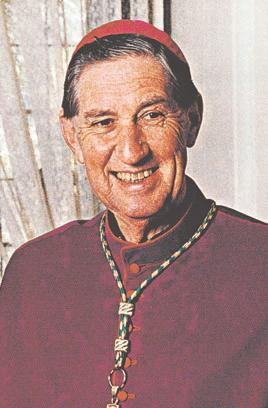
My thesis is comprised of surveys as well as interviews, so there was qualitative and quantitative study. In both the surveys and the interviews the results matched each other fairly consistently.
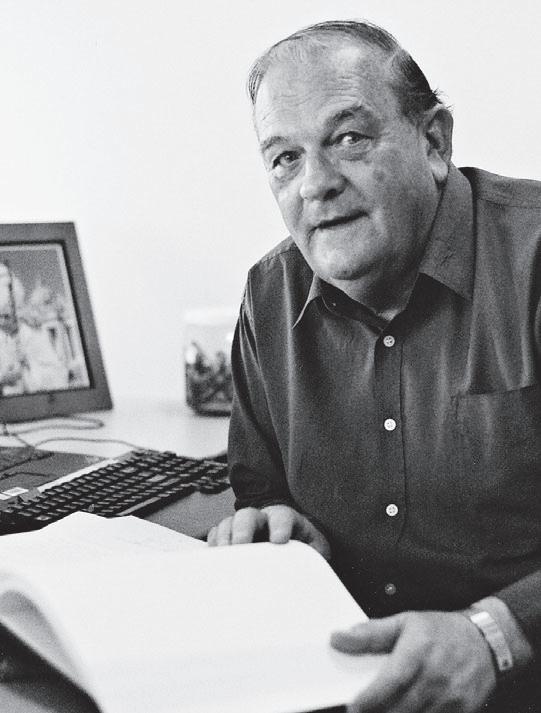
They believe they have some form of spirituality but that they need not necessarily be following a religious denomination that they see themselves combined to or with.
… Students are turning to spirituality – such as New Age groups - and I think that they are not being fulfilled in their search.
Q. What does this tell us about Catholic schools in WA?
Firstly, I also looked at parents’ influence on the student’s religious development, the influence of their peer group, the teachers’ influence, and I looked at students’ general attitude towards the school.
In all those areas, students would generally see that none of these had a particular influence on their religious development. I realise there are other influences besides religious education classes that have an impact on what they believe and how they act.
I then go to RE classes and Church documents and the Mandate from the Catholic Bishops of Western Australia and ask them what makes a Catholic School
Archbishop Hickey pointed to the key role that teachers seriously interested in helping communicate the reality of the Church’s vision of love and life will play in meeting the challenge posed by factors such as the secular society and family backgrounds.
“The Saker study has given a clear statistical and descriptive face to a situation that we all know something about and to which we must find answers,” he said on Tuesday.
“The answers cannot be only about Catholic schools, nor about religious education with Catholic schools, because family background and Australia’s secular social environment are seriously complicating factors.
“Nevertheless, at the level of our Catholic schools we need to make sure that our teaching materials are of the highest standard, that our teachers pass on not only the content of the faith but their love of the faith through their personal commitment and witness to it.
“The new RE Units will be a great help. There is no lack of Catholic content in them.
“The insistence that all teachers of RE be themselves people of faith and the search for teachers who will volunteer to teach RE full time because of their enthusiasm to light a fire in the hearts of the young will go a long way to making up the deficits of a secular culture and a family background where the faith was weak.
I believe they are meant to be - the Catholic education of students.
Experiences are important and that’s where we’ve gone with RE classes. We’ve gone to the experiential side of RE, and that’s OK. But in doing that, we’re neglecting the knowledge side.
But if I reject something, I believe I have to know why I’m rejecting it.
My experience here with University students and what they say on abortion or contraception - particularly contraception - is that they’re rejecting the Church’s teaching.
But then you ask them why they are rejecting the Church, and they don’t know.
And when you tell them the Church’s teaching on contraception – again they don’t know.
The religious education guidelines that are around Western Australia are mostly based on experiential methodology, and it’s not working.
So my argument and my conclusion from the thesis is that somehow you have to take the experiential, but also introduce the knowledge component.
I run a unit here at ECU that looks at the moral teachings of the Catholic Church such as contraception, abortion, masturbation and homosexuality amongst others.
At the end of the unit students will invariably come up and say ‘thank you’ because they now understand why the Church teaches what it does about these issues.
Now they can come from a basis where there are either accepting it or rejecting it for a reason, whereas previously they were accepting or rejecting without any knowledge at all.
And you can’t reject [or accept] anything, I think, until you have knowledge.
So I argue that you need to have a knowledge-based component particularly in senior RE classes. I think we’ve lost that ‘who are we?’ factor.
If you look at the thesis findings you couldn’t even say they’re coming out with an experience of Christ as a person in their life. It’s just not happening. They’re coming out with no experience and no particular background of their Catholic tradition.
Q. Is it not a problem with the parents and the families that we are talking about here? Isn’t it unfair to blame Catholic schools alone?
You’ll find in the thesis I don’t do that.
I acknowledge the fact that parents and peers also have an influence.
They had a duty not only to pass on the content of the Faith, but also to encourage the students to attend Sunday Mass, and to pass on the practices, customs, observances and culture of a living Faith.
The most disturbing findings, I thought, were that 90 per cent of them aren’t practising the Catholic faith - for example, going to Mass on Sunday.
Another disturbing statistic I came across was that prayer is not relevant to them once they leave school. And the whole area of morality, for example, the Church’s teaching on contraception, abortion, homosexuality, euthanasia, invitro fertilisation and even marriage and divorce - they were rejecting all those.
Archbishop Barry Hickey“It is obvious that the witness of the teacher is as important as the content he or she teaches,” the Archbishop said.
“Although the policy does not always work perfectly, it should be the constant aim of the schools to employ such teachers.”
Sustained efforts would be made to find suitable teachers who will teach RE on a full-time basis.
“They are not easy to find, but there are already some in our schools and their numbers are growing,” he said.
“This is a very good option to pursue because, while not all teachers want to teach RE, others see it as the main reason why they are teaching in Catholic schools,” he added.
Q. Are you saying that Catholic schools are simply not carrying out the actual reason for their existence?
Yes. They are not carrying out the mandate given to them by the Catholic Bishops of WA intended for Religious Education. In other words, the mandate given by the bishops was intended for youth and I’m not convinced that this is being carried out successfully.
Q. What is your understanding of faith?
That was a question that was asked in the survey.
Do they see themselves as a people with faith? – the answer was yes. Then I asked what do you understand by faith?
I guess if you wanted a clinical definition and one that I would admire closely is that if I have faith, then I search for meaning, I search for understanding.
“I hope parishes and families will also respond to the call of the new evangelisation and turn around a trend in society that has worked against the communication of a vibrant Catholic faith.”
What I found in the survey is that students were answering ‘yes we have faith,’ but they didn’t know how to express it.
There was no search for meaning.
I can only guess they were confusing faith with spirituality – they would say that they were spiritual people.
In fact approximately 95 per cent of them regarded themselves as spiritual people.
But spiritual people could be people who have no particular belief in religion at all.
or what constitutes a Catholic school, and the students are pretty clueless.
Looking at that mandate in Chapter 1, [of the thesis] where the West Australian Bishops say what constitutes a Catholic School, and looking at what is actually being turned out - first and second year university students - then I would say Catholic schools are not living up to the mandate set by the Bishops and the RE classes are not effective in what
Cardinal George Pell of Sydney said recently, and I agree with him entirely, that the days are gone when we can rely on the parents and the parish to provide the Catholic education for young people because they are just not going.
He said that because parental guidance is lacking in a lot of cases then the RE classes need to become the focal point for passing on the faith tradition.
You’ll find in the General Directory for Catechesis published by the Congregation for the Clergy [the Archdiocese of Perth religious education guidelines rely heavily on this document] that when you do catechesis there is a basic understanding that the person you’re catechising has some faith.
But faith presupposes some knowledge. It should also be remembered that the
“Religious education is the first learning area in the Catholic School Curriculum. Religious education is the underlying reason for the school’s existence. If a Catholic school failed to offer the best religious education that it could offer to its students, it would be betraying its mission.”
- Bishops of Western Australia, 2001:19
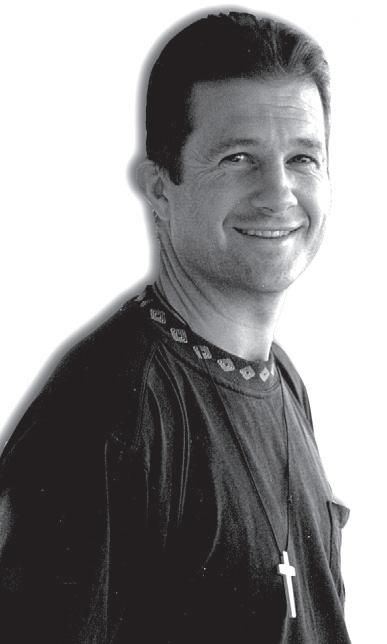
“The right and duty of parents to educate their children are primordial and inalienable.”
- Catechism of the Catholic Church 2221
While it would be convenient to single out deficiencies within the Catholic education system as the reason for the declining number of those practising their faith, it would not be wise. It is imperative that the conclusions of Dr Luke Saker are viewed in a broader context and, in particular, are not isolated from the responsibility of parents.
Unlike academic subjects such as mathematics and science, the moral and spiritual education of children is not a role that is delegated primarily to the school. Paragraph 2221 of the Catechism states, “The right and duty of parents to educate their children are primordial and inalienable”, in others words, the responsibility is essential and cannot be transferred. The role of the school should be to support and affirm what is being instilled in the home environment, not the other way around. If parents are serious about their child’s faith devel-
opment, then it is essential that they actively monitor that what is being taught at school is consistent with what is being practised in the home. It is in this more accountable framework that Dr Saker’s findings need to be evaluated.
If, as he claims, Catholic educated students are leaving school with little knowledge of Church doctrines and/or an unwillingness to accept them, then as the primary educators of their children, parents must be willing to accept a degree of responsibility. If children are not receiving faith education at home, then the chances of Church teachings taking root in their hearts and minds is minimal.
If parents expect schools to be the sole evangelists in the lives of their children, they should not be surprised when they succumb to the self-accommodating spirituality that is offered outside the Church.
If there is an absence of prayer, teaching, open discussion and a Christian lifestyle being modeled in the family home, any seeds that may be scattered by teachers in a classroom will, more than likely, fall onto shallow soil.
This is not to say that we should ignore the statistics presented by Dr Saker, but rather view them in
conjunction with the obligations of Catholic parents. With the advent of technology such as the Internet and the continued deterioration of ethical boundaries within the media, young people are being exposed to moral issues at an increasingly young age.
If they have not been equipped with a solid framework in which to filter this information, then the chances are that they will be more influenced by their peers, the media and what secular society perceives as truth. Even if schools do introduce students to the Catholic teachings on issues such as contraception, abortion or homosexuality, it will be difficult for them to understand their intended purpose if they have not been nurtured in an environment that advocates and models the unconditional love of God. In these situations schools inadvertently become like the Pharisees that Jesus rebuked, “They bind heavy burdens, hard to bear, and lay them on men’s shoulders” (Matthew 23:4). If children are given the law without a personal knowledge of the life and love of Jesus Christ, then parents should not be expecting them to bear any fruit.
Paragraph 2229 of the Catechism states that parents have the right to
“I think that the senior students had no real interest in religious goals to be honest. After four and a half years at school and the TEE hanging over our heads the last thing to focus on was the religious goals of the school.”
- Saker thesis, interview Sarah 2.
choose a school for their children that corresponds to their own convictions. Following this to its logical conclusion implies that students produced through the Catholic school system should, in theory, be reflecting the faith of their parents.
Dr Saker’s findings need to be considered by all parents in this light; to what degree does the school system undermine their convictions and to what degree does it mirror them?

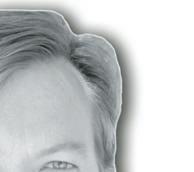




How Catholic is a school where a large percentage of the students, families and staff are not practising Catholics?
Catholic Education, misplaced hope?
■ By Derek BoylenDr Luke Saker’s thesis on Catholic education in Western Australia is somewhat damning and it is easy to look for a place to lay blame, but are our expectations of Catholic education too high?
To contemporary Australian culture, Catholic beliefs, values and practices are an alien experience. Australia is entering a postChristian era. Our children spend half a dozen hours, weekdays in school and spend the rest of it in a society saturated in counter Catholic rhetoric.
Nowhere is this rhetoric more counter Catholic than in media targeted at young people. Pre-marital sex is okay, abortion is okay, contraception is okay, de facto relationships are as good as marriage with the convenience of less commitment. Indeed, not only are these things considered okay but encouraged as normal behaviour. People who actually take their faith seriously, who go to Mass on Sunday and want to reach out to their fellow man are considered weird.
This information might not be anything new to readers but can we really expect much of Catholic education trying to exist in such a culture? The modern Catholic school is no safe haven from a society whose values have gone astray either. We only have to look around the Church on Sunday to appreciate that most of the children going to the school next door don’t come from practising Catholic families. Then there are the teaching staffs. A condition of employment at most
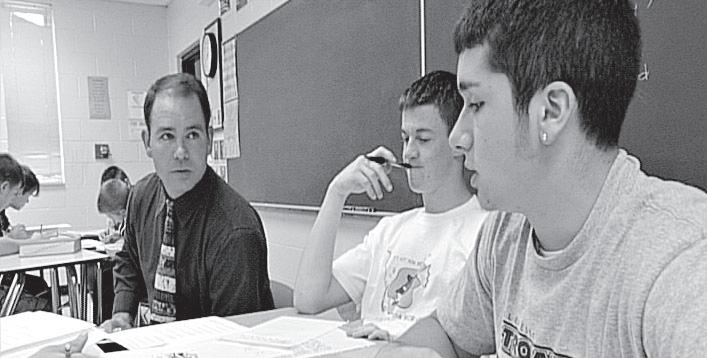
Catholic schools is support of the Catholic Ethos.
There is a huge difference between someone who says they support the ethos of the Catholic Church and a person of faith. How many of the teachers at your local Catholic school do you see at Mass on Sunday? And yet Evangelii Nuntiandi makes it quite clear that “the outstanding means of spreading the Christian Gospel is the witness of an authentic Christian life… Today, people listen more willingly to witnesses than to teachers, and if they listen to teachers it is because they are witnesses” (n. 41).
It begs the question: How Catholic is a school where a large percentage of the students, families and staff are not practising Catholics? Sure, they have religion classes given by people who are supposed to be practising Catholics. However, Dr Luke Saker’s views on that particular subject have been made clear elsewhere in this edition.
Starting a Catholic school is a serious business and the first Australian pioneers worked hard to give their children a Catholic education. The Church fathers also seem to have high expectations of our Catholic schools. As Dr Saker says, the Fathers of Vatican II emphasised that “all people have an inalienable right to education” and that all Catholic students should “enjoy a Christian education.”
Dr Saker also notes that in the revised Code of Canon Law (1983) every Bishop has a responsibility to ensure there is a Catholic school in his diocese.
I’m inclined to agree. With the right recipe you can do a lot for a person’s faith formation if you have contact with them six hours a day, five days a week for 12 of the most formative years of their life.
Young people often look up to their teachers; they are people of authority in their lives. What parent, when arguing with a child, hasn’t at
some stage heard the words “well, my teachers says…”
The primary means of evangelisation today is, as it has always been, an encounter with the Disciples of Christ, the faithful. Not mercenary Catholics, people paid to adhere to the ethos of the Catholic Church, but the real faithful.
I think the phrase Catholic students should “enjoy a Christian education” is helpful. A Christian education is not the same thing as an education in Christianity.
In my view a Christian education is an education that also sees the sciences, arts, social sciences, etc. through the Christian optic. It means making Catholicism a normal part of all aspects of a person’s education. We need more science, English, metal work and home economics teachers who are people of faith. I admit, finding them is no doubt a difficult process but possibly we’ve been taking the easy way out for too long.
Continued from page 3 to accommodate and feed yourself,” Mr Keating said.
On the Government’s proposed Fair Pay Commission, a new body charged with setting minimum wage rates, Bishop Manning said “it has been said that there will be an improvement. But I will have to wait and see on that.”
Bishop Manning said the Federal Government’s reforms are clearly aimed at damaging unionism. This should be “very much a concern” to Catholics, he said.
“The average worker in many cases has no voice of his own. He has been helped through unions who have taken up his cause for him. They (unions) have an absolute right to organise themselves and act collectively.”
Asked if he thought Catholic teaching endorsed the kind of labour market deregulation proposed by the Government, the Bishop replied: “Definitely not. The Catholic Church is looking to ensure that the dignity of the human being is being respected.
And some of these laws are going to do less than that.”
Bishop Manning is one of those Catholics who has long admired Workplace Relations Minister Kevin Andrews, and says: “I’m not too sure that one can pick out one politician and say that he’s responsible for this, because this is a Government decision.
“Kevin happens to be the spokesperson for it. I know that he’ll be as fair as possible.
“But then again, when you are part of a Government and having to speak their philosophy, sometimes the integrity of the person does give way to the voice of the Government,” Bishop Manning said.
Even more critical than Bishop Manning’s were the comments of Rob Lambert, an associate professor at the University of Western Australia and a former advisor to the South African Catholic Bishops Conference on employment issues.
Prof Lambert described the changes proposed by Mr Andrews as extreme, repressive and antidemocratic. “They are denying people a voice in their workplace,”
he said. The Government’s changes represent “a low-wage strategy to cut wages and conditions and impose a Chinese model on Australia,” he said. The changes are “quite foreign to the whole history and tradition of this society,” Prof Lambert said.
“There is a fault-line assumption running through all of the Government’s proposals, which is that individuals and employers can negotiate in the workplace and in the labour market on equal terms.
“This is clearly not the case,” Prof Lambert said.
Prof Lambert also endorsed Bishop Manning’s comments on the threat to unionism in the new legislation. “The Government denies this, but they’re actually limiting and restricting union access to workplaces,” he said.
“What they’re doing with union membership is like letting you join a golf club, but telling you you’re not allowed to play golf.”
A five-day Senate review of some provisions in the Federal work laws is expected to be completed by early this coming week. Family First Senator Steve Fielding is push-

ing for several changes, including the non-compulsion of employees to work on public holidays, respect
Catholic education as multi-layered:
■ the vast majority of families with children enrolled in Catholic schools are largely disconnected from the Church except by virtue of enrolment of children ie. they are not practising Catholics either and the culture of the home forms and mirrors students’ attitudes;
■ the culture of schools, over time, will tend to reflect the makeup of the families as students such as Dr Saker’s subjects return to teaching careers in Catholic education;
■ the Church has been concerned for decades at corrosive trends in key cultural influences such as entertainment, the media and politics which are dismissive of formal religious belief, especially the Catholic Church’s principled stand on bioethical and moral issues regarding God’s plan of love and life for every person.
Families entering Catholic education are formed more by contemporary society than the Church.
The raw material Catholic educators must work with is already largely indifferent to the Church in the home.
It can be interpreted as a warning that for some years, probably decades, the Catholic Church and Catholic educators have been progressively losing the battle to educate students in the faith in which they were baptised; on litmus-test moral issues the culture of Catholic education among students is essentially ignorance and indifference.
Dr Saker, a Marist brother and former teacher, has lectured teaching students at ECU’s Mt Lawley campus for the past 12 years.
While students often subscribe to a vague belief in a warm and loving God, they do not believe in the religious and moral principles which lie at the heart of Christianity.
A picture has emerged of students and, likely, families who are nominally Catholic by virtue of being baptised as members of the Catholic Church, but are ignorant and/or indifferent to what is important about Catholicism. To this extent they appear indistinguishable from their counterparts in secular education.
Dr Saker’s study raises the issue of whether a fundamental rethink is needed of the approaches taken by the Church and Catholic educators to try to communicate to students something of the living reality of the Church and its relevance to modern life.
But if the culture of families participating in Catholic education in the state is that they have almost no understanding of essential facts about the Church, no interest in being or becoming a Catholic Christian, and largely see it as irrelevant to their lives in key moral issues, making inroads into this mentality could be extremely difficult.
Among the alarming nature of Dr Saker’s findings are that all 10 students who were interviewed indicated they would be happy to teach Religious Education in Catholic schools even though they regard the Church as essentially irrelevant in key areas.
Four questions guided Dr Saker in his study:
• Are Catholic schools in WA carrying out the mandate for their existence – the Catholic education of their students?
• Did students perceive their religious education classes as aiding their religious development?
• Do students accept or reject important doctrinal teachings of the Catholic Church?
• How do students perceive their lived experience and the Church’s teaching on morality?
for a 38-hour working week and the enshrining of 30-minute meal breaks every five hours of work.
Student teachers became the subject of Religious Education research
directory also speaks about pedagogy of knowledge as being an important part of RE classes.
Unfortunately that’s not the case with most students in our schools.
So we’re trying to catechise before instilling some form of formal faith.
My argument is that the faith we should be instilling and teaching about is the Catholic faith…
Q. Do you believe parents are sending their children to Catholic schools for that reason?
I’m not convinced that parents are sending their children to Catholic schools for a Catholic education.
It would appear that parents are sending their children to Catholic schools not for its RE programme but because of the reputation and the good name of the school.
Q. What can we do to stop the present situation?
I go to Mass every Sunday at Doubleview, and you can count the number of people under 25 on one hand at the maximum. It’s just that young people are not going to Mass.
If, in actual fact, the parents are letting them down and society is letting them down, then there has got to be some avenue where at least we can say this is what the Church teaches and this is what it means to be Catholic.
Q. Do you think young people are interested in being Catholic?
I think so. The students that come here to ECU often say thank you at the end of the course. There’s no mass conversions but at least they come up and say ‘we understand now what it’s all about.’ And they didn’t before.
I think what we’ve done to the RE classes is we’ve made them generic. We talk about nice little things. A little bit of knowledge and content doesn’t hurt.
Q. What specific recommendations would you make to remedy the situation?
I think one of the things that we have to
do is we have to look at the West Australian Curriculum guidelines for RE and question the present method of relying primarily on catechesis - is it worth it?
Q. What are the implications for the future?
I think that unless we sit down and take some notice, unless we have a look at what we are producing at the end of Year 12 as far as Catholic students, or Catholic people are concerned…the implication is that it’s going to go from bad to worse.
I think the implications for the future are recommendations from the thesis that we have to get together and sit down and look at the whole RE program and see what is an effective way we can combine catechesis and religious knowledge into a solid RE program, These steps are being undertaken in Sydney by Cardinal Pell.
Q. We’re you surprised by what you found? Is this what you were expecting?
I certainly was expecting some of what I found but I was rather surprised at the number of senior students who don’t attend Mass regularly.
I was also surprised at some of the absolute rejection of Catholic teaching, and the reason they rejected it was because they didn’t know what the Church teaches.
I think the major area that the Catholic Education Office and the framers of the RE curriculum have to sit down and look at the present curriculum asking where is the Catholic theology within the classes. Catechesis can still be part of it.
Knowing Catholic doctrine and dogma is not going to change their opinions, but at least they will know why and what they are rejecting.
Q. Are you saying the entire culture of the Catholic school system in WA needs to change?
The challenge for Catholic Education in the third millennium is to incorporate into the RE curriculum both catechesis and the actual teachings [dogma/doctrine] of the Catholic Church.
- Jamie O’Brien

The new United States ambassador to the Holy See, Francis Rooney delivered his address to Pope Benedict XVI last Saturday November 12, giving his credentials and drawing on the previous relationship of the US Gov’t and Pope John Paul II. This is a copy of the text released by the US Embassy.
Your Holiness,
I have the distinct honour to present to you my credentials as Ambassador Extraordinary and Plenipotentiary of the United States of America to the Holy See. I wish to extend warm greetings from President George Bush and the American people. I am grateful to President Bush for the opportunity to represent him and my country to the Holy See. It is a particular privilege to be the first American ambassador of your Pontificate.
Your Holiness, I would like to recall the excellent relations my country had with your predecessor, the late Pope John Paul II. The people of the United States recall fondly the seven pastoral visits that the late Pontiff made to our country. During his pontificate, the US and the Holy See established full diplomatic relations after many years of less formal ties. The past 21 years have seen the flourishing of a productive and effective partnership between the United States of America and the Holy See on initiatives to make the world a better place and to bring greater peace, security and freedom to its people.
The United States looks to the Holy See as a partner in efforts to spread peace, encourage democracy, and to defeat terrorism. This task will require long-term efforts among likeminded partners to overcome the intolerance and hatred that lie at the heart of those determined to spread terror. From the moment of the 2001 terrorist attacks against the US, the Holy See has been a consistent voice in condemning religiously-inspired terrorism. At the same time it has called for tolerance and
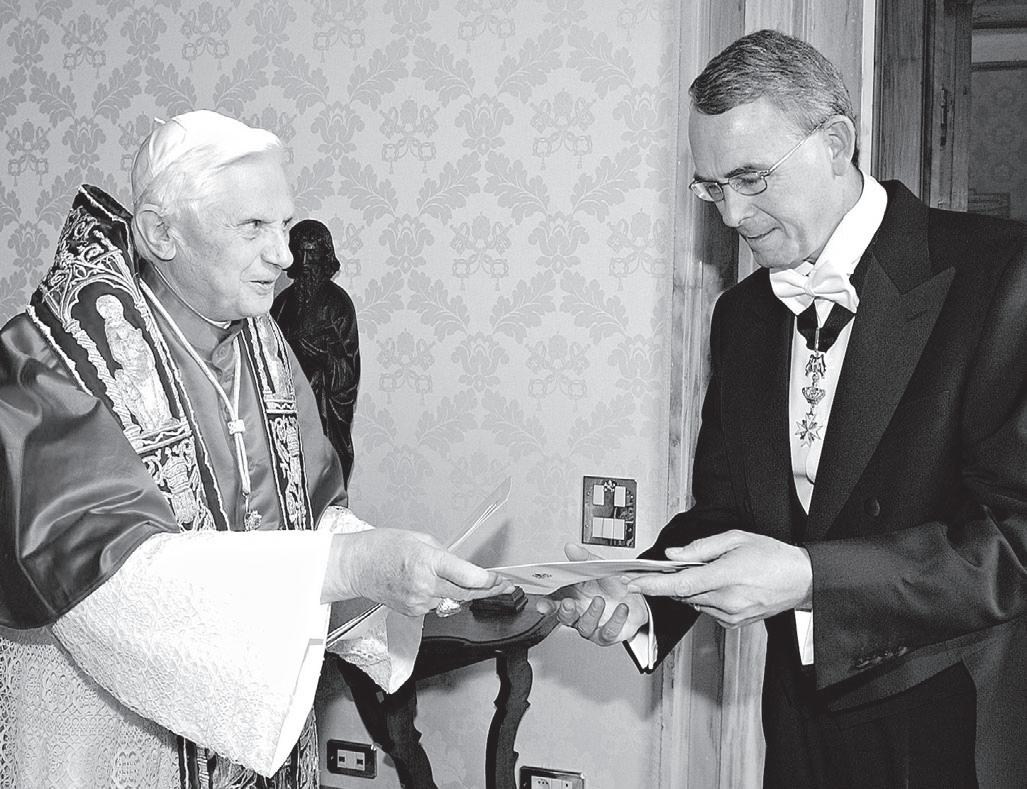
outreach to all. I recall that 2005 marks the fortieth anniversary of two key documents of the Second Vatican Council - “Nostra Aetate” on the Church’s relations with non-Christian religions and “Dignitatis Humanae” on religious freedom.
The United States sees in these documents the spirit of outreach, tolerance, respect and dialogue among diverse peoples that we wish to promote in our own society - and around the world. These are the principles that we can use to work for the spread of true peace and democracy.
The US and the Holy See have collaborated in recent years on many related efforts to further the cause of human dignity. We have joined to address the problem of hunger and malnutrition in the world, rampant in so many areas. The US government recognises the impressive work carried out by Caritas
agencies, religious congregations, lay associations, and volunteer organisations affiliated with the Church on this score. At the meeting of world leaders at the United Nation’s Food and Agricultural Organisation’s headquarters in Rome in October, Your Holiness’s message called for greater international solidarity in the arduous task to fight starvation and malnutrition.
We pledge to continue our efforts on this front, providing a substantial amount of the world’s food aid and acting to improve the many circumstances in the developing world that contribute to hunger.
Further, we believe that the advance of agricultural science and technology can help human beings, even in the most difficult environments, to produce crops to feed more of their own people. We look to the Holy See to help the world recognise the moral imperative
of a true investigation of these technologies.
Food security is intimately linked to another world crisis - the HIV/AIDS pandemic. Too many people in developing nations today are dying of AIDS.
Whole generations are being wiped out by what has become the plague of our age. We applaud the efforts of the Catholic Church and affiliated agencies that we understand provide more than a quarter of the care and assistance for persons with HIV/AIDS worldwide.
New initiatives such as the Holy See’s Good Samaritan Foundation are making further strides in this fight.
In many cases the US government is working hand in hand with these organisations, offering desperately-needed funds to give the sick the best care possible. Collaboration such as this between the US government and faithbased organisations can be an important tool as we confront these challenges.
The United States has also joined with the Holy See in efforts to halt the trafficking of human beings across international borders. This modern-day affront to human dignity needs to be stopped.
Men, women and children continue to be lured or coerced into domestic servitude, sexual exploitation, and forced labour. With the Holy See’s powerful moral voice and the human and material resources of the US, I believe we will be successful in stopping this evil.
I take pride in a program we sponsor to train women religious in anti-trafficking skills and strategies. This program is now active in five countries in Europe, Africa and Asia and next year we hope to introduce it to women religious working in Brazil, Portugal and the Philippines.
Your Holiness, I believe the United States of America and the Holy See share a mutual respect and common goals. I am confident we will succeed in our determined efforts to bring our world the gifts of peace, justice, freedom, economic opportunity and democracy - for all. Thank you, Your Holiness.
- CNSA United States Catholic couple who created a DVD for children said they hope it will foster holiness and a love of prayer in children, “one baby at a time.”
“Holy Baby 2: Jesus Loves Me, He Is the Bread of Life” features a cartoon character named Baby Bosco - based on St John Bosco, who ministered to children - and his frisky dog, Grigio, who protected the saint. Other images include toys, colourful lights, mountain scenes and children playing and praying.
The 40-minute disc includes hymns sung by children, as well as narrated Scripture readings and prayers, including the Nicene Creed and the divine praises, which are 14 praises traditionally recited or sung to conclude the Benediction of the Blessed Sacrament.
Wayne and Dede Laugesen cre-
ated the DVD as a follow-up to one they released in 2003 for the year of the Rosary - “Holy Baby: Seven Prayers in Seven Languages” - which teaches the prayers of the rosary.
“Holy Baby 2” focuses on the Eucharist; it was created during the Year of the Eucharist, which ended on October 23. The prayers and Scripture readings can be played in English, Spanish or French.
Wayne Laugesen noted that the DVD is completely prayer-based.
“There is no storytelling,” he said. “It’s not teaching lessons or preaching to children. What we felt was lacking in children’s programming was just prayer.”
Rather than trying to teach doctrine or theology, the DVD, which is for children up to age 7, highlights what Dede Laugesen calls “the language of prayer.’ It shows how to talk to God - how to worship him, praise him, thank him, go to him,” she told the Denver Catholic Register, newspaper of the Denver Archdiocese.
“Prayer is a language that God has given us to communicate with him.” -CNS
Thirteen Mexicans, martyred during the religious persecution of the 1920s, will be beatified in Guadalajara next Sunday according to Benedict XVI’s new guidelines.
Among the martyrs who died during the so-called Cristero war of 1926-1929, the most outstanding is Anacleto González Flores.
He was a lay leader who was very active from 1915 until the year of his martyrdom, 1927, at the hands of the federal army commanded by Mexican President Plutarco Elías Calles.
González Flores founded the Popular Union, better known as the “U,” a movement that included labour, women and farmers. It promoted catechesis and actively opposed the local and federal governments in their measures to suppress religious freedom.
Because of his option for pacifism and non-violence during the Cristero war, González Flores was known as the “Mexican Gandhi.”
Married and the father of two, “Master Cleto,” as he was known, was born in Tepatitlan, in the state of Jalisco, in July 1888. He came from humble origins. The son of an alcoholic weaver, he did various jobs until he received his law degree at 33 in 1921. Before that, he had been a seminarian and postulant in the seminaries of San Juan de los Lagos and Guadalajara.
In 1914, when all churches were closed on the order of José Guadalupe Zuno, governor of Jalisco, González Flores organised the Popular Union and founded the newspaper Gladium, “sword” in Latin, a word with which he already dreamed of martyrdom. Confrontations between the government and Catholics started in July 1918, to which González Flores responded with the philosophy of “peaceful resistance.” He was arrested in 1919 for his social, political and religious ideals. Three years later he coordinated the first Catholic Labour Congress in Guadalajara and organised the National Catholic Labour Conference that spread
throughout the country. In May 1925 the National League in Defence of Religious Freedom was founded in Mexico City. It favoured recourse to arms but González Flores disagreed and insisted on moral strength to win the battle.
Militants arrived in the capital in 1926 with an ultimatum for the Popular Union, which obliged him to enter the National League. The armed movement began the following year, which González Flores accepted with regret.
General Jesús Ferreira decided to put an end to the Popular Union by taking the “Master” prisoner. González Flores was arrested on March 31, 1927 and martyred the following day. His executioners hanged him by his thumbs and then, at bayonet point, kept torturing him to disclose the whereabouts of the Archbishop of Guadalajara and other leaders of the Cristero Revolution.
Finally, the steel blade fatally pierced his heart. At the same time, his companions in the struggle and martyrdom, were shot at the same prison. - ZENIT
An upcoming ABC movie on the life of Pope John Paul II is going to focus on the “human point of view” of the pontiff, setting it apart from a competing movie about the Pope planned by CBS, according to Italian television veteran Lorenzo Minoli, producer of ABC’s film.
“Have No Fear: The Life of Pope John Paul II” will air in the US from 8-10 pm EST, on Thursday, December 1, on ABC which announced its air date after CBS had committed to December 4 and 7, as the dates for its own two-night papal ministeries.
Six years ago in Hollywood, CBS president Les Moonves uttered a now-classic line of hubris about CBS’ and NBC’s separate TV-movie projects at that time about the life of Christ. “Our Jesus is better than their Jesus,” he said.
The CBS version was produced by Minoli. Now that his deal this time is with ABC, would Minoli dare say that “our Pope is better than their Pope”?
The short answer: No. “There is nothing good in bashing others.
I think that one thing I’m sure of is that our movie’s different from theirs,” Minoli told Catholic News Service in a telephone interview from New York, where he was see-
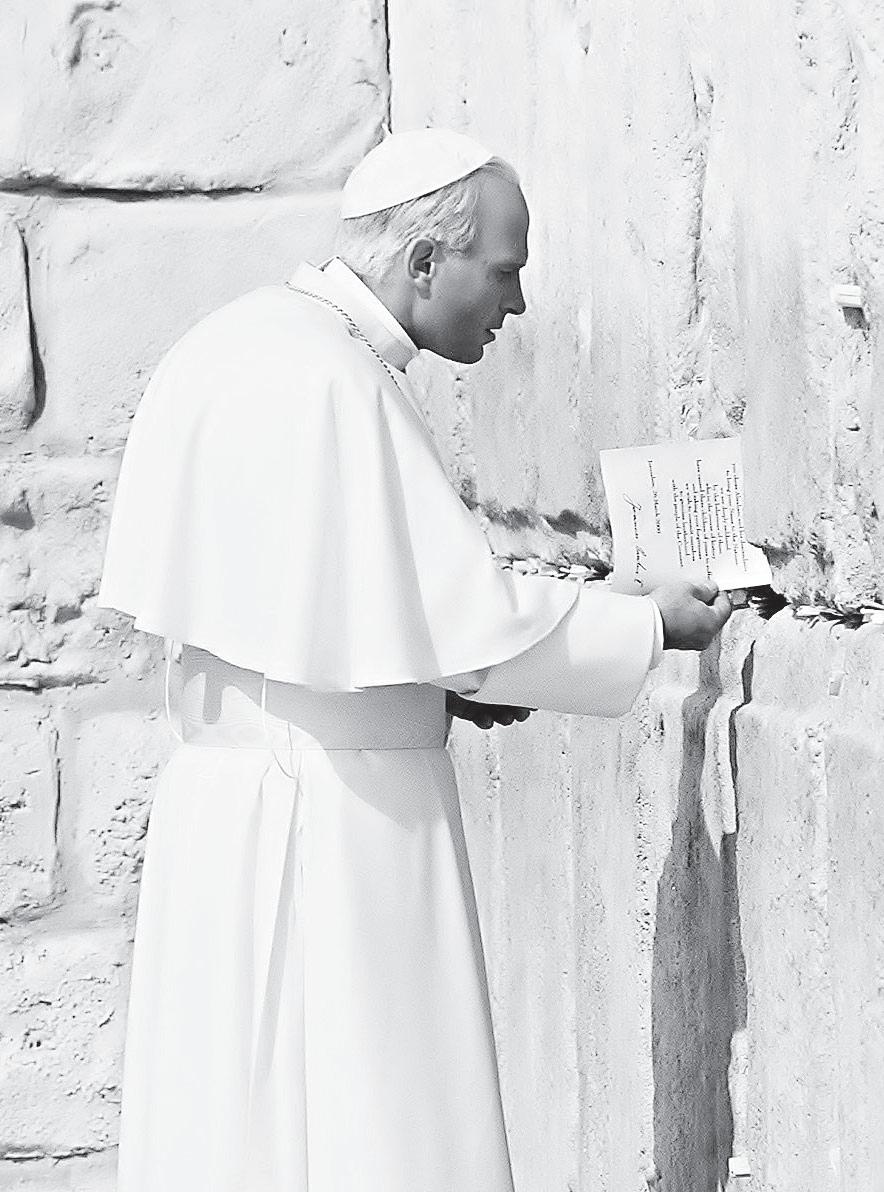
ing the completed project for the first time.
“I don’t want to say my movie is better than the other movie. I want to say my movie’s different.
The reason is the point of view, the human point of view of this man,” Minoli said.
“We focused on some of what I believe are the essential messages
that he gave us,” he added. “This Pope, very much, had no fear.”
Throughout “Have No Fear,” the Pope, played by Thomas Kretschmann, shows courage and resolve not only as pontiff but as a cardinal, bishop, priest and student in his native Poland.
In the film a scene of Pope John Paul II skirmishing with Polish communists is shown prior to file footage of the Berlin Wall coming down, signaling an end to the communist domination of Eastern Europe. But the Pope also expresses his disappointment to Poland’s bishops about the heightened materialism and lowered moral values of his homeland after communism.
Minoli said he wanted the audience to understand that “the Pope got rid of the communists” but also to have them see that not everything was fine, Minoli said. “He was speaking against ... the material world. And I think that was very important to him.”
“Have No Fear” also dramatises the Pope’s last public appearance on March 30, when he made a surprise appearance at his studio window to bless thousands of pilgrims gathered below in St. Peter’s Square. It shows Pope John Paul trying to speak to the crowd, using a microphone, but the few syllables he uttered were incomprehensible. He died on April 2.
Minoli said the Pope was trying to say at that point, “‘Have no fear of your being frail, of your weaknesses and of dying,’ and it was showing that to young witnesses. I think it was a wonderful message.” -CNS
The death of Pope John Paul II and the election of Pope Benedict XVI, invites the Church to renewal and evangelisation, said Archbishop Gabriel Montalvo, apostolic nuncio to the United States, on the opening day of the US bishops’ fall general meeting.
“The Church is alive. She is alive ... because Christ is alive,” he said on November 14.
The Archbishop called on the bishops to foster church unity by strengthening their “collegial communion” with the new Pope.
“Unity with the Holy Father and with each other strengthens the proclamation of Christ to the world,” he said.
The Archbishop noted that Pope Benedict also has issued strong calls for Christian unity, citing the need to present a unified Christian vision for addressing contemporary ethical problems.
“Division is contrary to the vision of Christ,” said Archbishop Montalvo.
Church leaders must work “to bring a common witness to the ethical challenges of our time,” he said.
The Archbishop told the bishops that with all the problems in the world “it is difficult to maintain a joyful spirit” but they must “manifest joy to the world” because “joy is an assurance of Christ’s presence among us.”
- ZENITAs Christians and Jews explore their shared spiritual heritage, they can help usher in a future of peace and reconciliation among peoples, Pope Benedict XVI said.
On November 14, the Pope met with Rabbi Marvin Hier, founder and dean of the Los Angeles-based Simon Wiesenthal Centre, and with three-dozen representatives of the centre.
Before the meeting, Rabbi Hier had said the focus would be on “global terrorism and Iran’s recent call for the obliteration of the state of Israel.”
“Today the greatest threat to mankind comes not from secular-
Benedict XVI has received in audience the President of the Iraqi autonomous region of Kurdistan, in the context of a series of meetings and interventions to foster stability in the country.
Masoud Barzani, who in the past has shared the governance of the Kurdish region with the new Iraqi president, Jalal Talabani, is a leading voice of his community. On occasion Barzani has said he favours independence.
Since the Gulf War, the Kurds, who represent one-sixth of Iraq’s 26 million inhabitants, have enjoyed considerable autonomy in three northern provinces.
Last Thursday, the Holy Father received
ists and atheists, but from religious fanatics and zealots,” he said.
The Simon Wiesenthal Centre is a human rights organisation for the Jewish people.
In his speech to the group, Pope Benedict XVI spoke of the 40th anniversary of the Second Vatican Council’s document, “Nostra Aetate,” which he said, “formulated the principles that have guided the Church’s efforts to promote better understanding between Jews and
President Talabani, and on Saturday November 12 he met with the Synod of Chaldean Bishops, of Iraq, at a gathering in which he encouraged them to follow “the path toward reconciliation and peace.”
NAIROBI, Kenya (CNS) - Kenyan Catholic bishops have urged leaders to refrain from issuing derogatory statements in public and from lying to Kenyans during referendum campaigns for the country’s proposed new constitution.
The bishops warned that violence taking place in the campaigns was not only physical but what they described as “violence of the mind,” noting that the “blatant lies, intimida-
Christians. After a difficult and painful history relations between our two communities are presently taking a new, more positive direction.”
Pope Benedict said that drawing inspiration from “our shared spiritual heritage” and committed to the good of the human family Christians and Jews have an obligation to continue to foster respect and dialogue.
“Christians and Jews can do
tion, threat or inculcation of fear” could have a psychological effect on Kenyans.
A pastoral letter signed by 28 bishops called for a high voter turnout and urged Kenyans to remain united after the November 21 vote. The bishops said it was important voters based their decision on their consciences because the referendum would determine the destiny of the nation.
The bishops also called on “all Catholics and people of good will to hold three days of prayer” from November 18-21 in preparation for the vote, which they called a “historic exercise” that should be “one of pride for every citizen.”
The referendum for the new constitution would be the first for the country since a charter was created just before Kenya’s independence from Britain in 1963.
Critics say the draft constitution fails to curb President Mwai Kibaki’s powers, while
much to enable coming generations to live in harmony and respect for the dignity with which every human being has been endowed by the Creator,” the Pope said.
“I express the hope, shared by men and women of good will everywhere, that this century will see our world emerge from the web of conflict and violence and sow the seeds for a future of reconciliation, justice and peace,” Pope Benedict said. -CNS
the draft’s supporters say it will limit him. The new constitution allows for a separate system of Christian, Muslim and Hindu courts and prohibits abortion and same-sex marriages. It also allows women and men an equal right to inherit and manage property.
They advised Kenyans to study the proposed constitution and vote according to their consciences. They urged those who remain unsure of how to vote to seek advice from “competent people and weigh carefully such counsel.”
In the pastoral letter, “Be Not Afraid,” the Bishops tried to assure Kenyan Catholics that “God is with his people” and would not abandon them. They pointed out that even after the vote Kenyans should continue to build the nation.
“Whatever the outcome, let us accept the result,” they said.
US author James Stenson has brought a refreshing and new approach to helping parents solve the practical problems of family cohesion and the religious upbringing of children.
The Religious Upbringing of Your Children
ByJamesStensonPublishedbyScepterPublishers
AvailablefromTheRecord
$28pluspostage
■ Reviewed by Mark Reidy
The divine mission of parents is to impart God’s love to their children says US author James Stenson. In his book “Lifeline”, he is adamant that without a deep, heartfelt personal relationship with God, children will abandon their faith before they reach adulthood.
Stenson draws from his 20 years experience as an educator to provide spiritual and practical guidelines as to how this can be made possible. He acknowledges that the task requires relentless dedication, love and a reliance on God, but believes that the rewards of competent, responsible, confident adults who live by Christian principles should provide the motivation.
Stenson’s approach is based on the understanding that character and faith do not spontaneously appear in children and must be formed from an early age. It is the role of parents, he says, to nurture the transition from self-centredness to the formation of a moral conscience. Children cannot be expected to do what is right, Stenson writes, if they do not know what is right. It is the parents’ mission, to form character and conscience within their minds, hearts and wills so that they will learn not only what is right but also possess the discernment and strength to apply it in their lives.
To do this, Stenson says, parents must instil in their children virtues of: faith, hope, charity, prudence (sound
judgement), justice (responsibility), fortitude (courageous perseverance) and temperance (self-mastery). He outlines ways in which parents can teach these characteristics and provides several helpful lists to focus them in their endeavours.
He believes that formation of children comes through three avenues; (1) the personal example of parents, (2) what they are repeatedly led or made to do and (3) verbal explanation. But these will only be effective if they are carried out in an environment of unity and sacrificial love and underpinned by a discipline that is motivated by adult formation rather than convenience or anger.
He provides the reader with his observations of what he perceives as the characteristics of successful parents, including practical advice on dealing with specific behaviours, on how to compete with electronic and printed media and the rights of children.
In regards to discipline, Stenson is adamant that parents would have relatively few problems if they concentrated their correction in three areas. If children were dealt with every time they showed disrespect for parents, for their authority or deliberately told lies, then the effects would filter through to lesser matters, especially as they grew older.
Stenson addresses aspects such as; family dinners, the importance of quality reading, a need for social and political awareness, the influence of positive role models, the sharing by parents of their personal and family histories and the need for encouragement, as aspects integral to the successful formation of children.
While Stenson focuses most of the first six chapters of his book on the long and short term aspects of parenting and their practical application, the final four chapters underline his belief that the fullness of life for children will only be complete with a foundation of Mass, Sacraments, prayer, Bible reading, Catechism and faithfulness to the Church.
God’s love for your family and yours for Him and one another is the lifeline that will save your children, Stenson says. It is this love that will turn children’s hearts to God and win them earthly and eternal happiness.
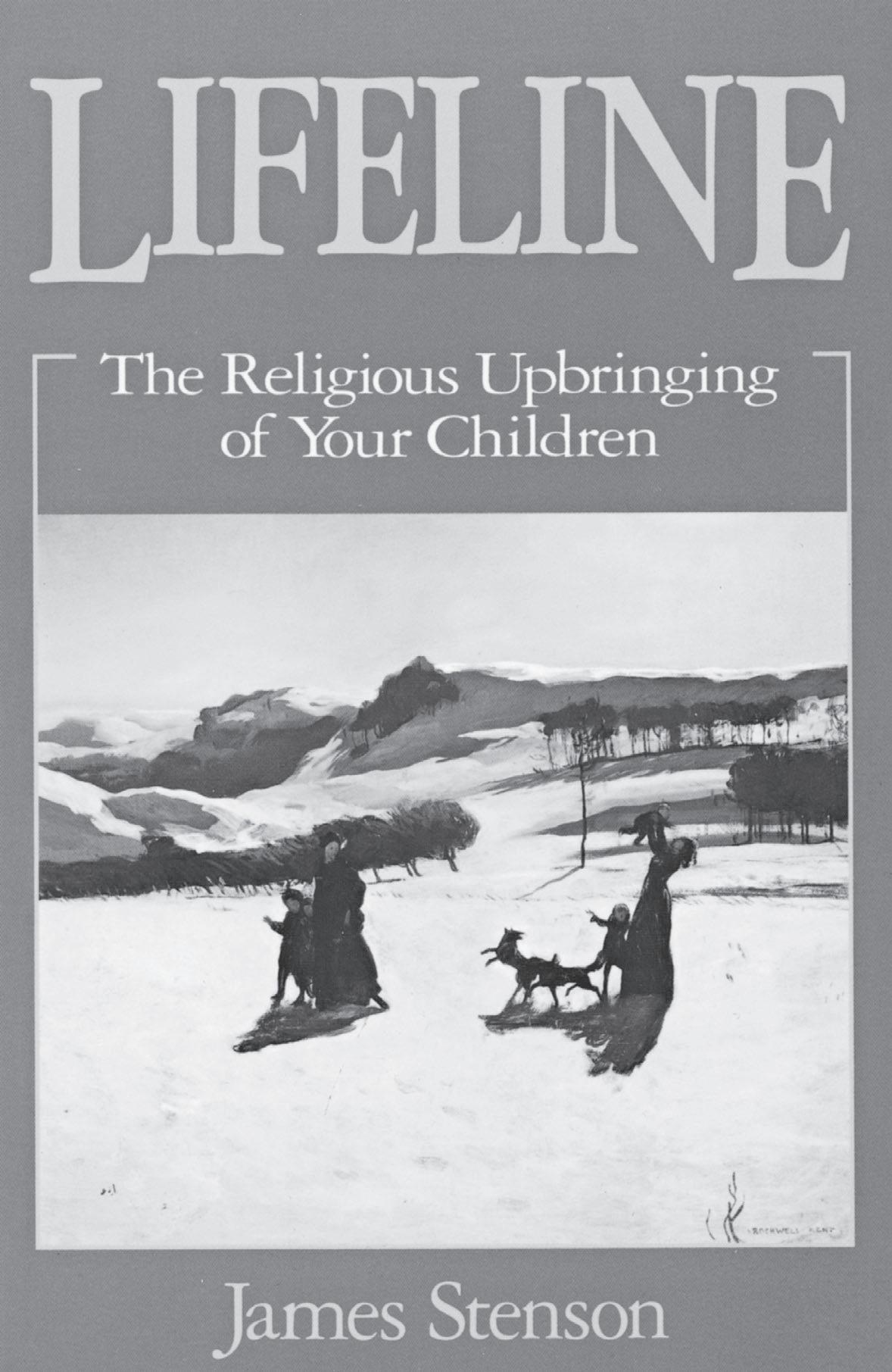
Sunday, November 20
ETERNAL WORD TELEVISION NETWORK
1 2 PM ON ACCESS 31:
The Remarkable Story of a Nun, her Nerve, and a Network of Miracles. Author, Raymond Arroyo, discusses his biography of Mother Angelica with Fr Mitch Pacwa [EWTN Live] Don’t miss this intriguing insight into the history of EWTN, and its much loved foundress! Please send donations to keep the program on air and enquiries to The Rosary Christian Tutorial Association, PO Box 1270, Booragoon 6954.
Enquiries: 9330-1170
Sunday November 20
FEAST OF CHRIST THE KING EUCHARIST PROCESSION
3pm, Schoenstatt Shrine, 9 Talus Drive, Armadale. Children who have received their First Holy Communion this year are encouraged to come in their First Communion dresses/suits. Phone: 9399 2349, email: shrine@elink.net.au. Please bring a plate for afternoon tea.
Sunday November 20
FEAST OF CHRIST THE KING
The Divine Mercy Apostolate invites everyone to celebrate the Feast of Christ the King at St Anne’s Church in Bindoon. A coach will pick up passengers
from Our Lady of Mercy Church, Girrawheen at 9am, St Bernadette’s Church, Glendalough at 9.30am, Sts John and Paul Church, Willetton at 10.15am then to St Anne’s Church Bindoon. Tea and coffee will be provided during the day and after the afternoon’s celebrations. Coach will depart Bindoon at approx. 5.30pm. For general or program enquiries please call: John 9457 7771 (SOR) or Charles 9342 0653 (NOR).
Sunday November 20
SOLEMNITY OF CHRIST THE KING BULLSBROOK SHRINE
Most Rev. Peter Quinn, retired Bishop of Bunbury, will preside over the ceremonies to celebrate the Solemnity commencing at 2pm at the Shrine of Virgin of the Revelation, 36 Chittering Rd, Bullsbrook. There will be Holy Mass, Consecration to the Sacred Heart, Christ the King, exposition and procession of the Blessed Sacrament. There is ample parking and lawn areas are available for family picnics. Enq: SACRI 9447 3292.
Sunday November 20
FINAL MASS AT ST PAUL’S SWANBOURNE
A final Mass in being celebrated for the closure of the above church on Sunday at 8.30am. This Mass will be concelebrated by Archbishop Barry James
Hickey. All present and past parishioners are warmly invited to attend. Following the Mass a morning tea will be provided. For details contact: George Ayres 9384 9489 or email lifeayre@bigpond.com.
Sunday November 20
ORGAN CONCERT
St Denis Parish, cnr of Osborne and Roberts St, Joondanna. The parish is celebrating the 10th anniversary of its pipe organ. Mr Martin Rein will be the organist, playing selections from J S Bach, Vierne and Widor plus some improvisations. The concert begins at 3pm. Free will offerings will be accepted.
Tuesday November 21
SUNG LATIN MASSES
Presentation of the Blessed Virgin Mary 6.30pm. St Cecelia, virgin and Martyr Tuesday November 22 6.30pm. St John’s Pro-Cathedral, Victoria Ave, Perth. All welcome. Inq: Fr Michael Rowe: 9444 9604.
Friday November 25
HEALING FIRE BURNING LOVE
Our Lady of the Missions Catholic Church Whitfords, 270 Camberwarra Drive, Craigie 7.30pm – 9.30pm. Open your hearts to Jesus this advent. Come and experience His healing presence in the Word, sac-
raments and prayer with Fr Bob Carden in the celebration of the Mass and to follow praise and worship in the presence of the Blessed Sacrament with healing prayer.
Saturday November 26
JOHN XXIII COLLEGE
‘Growing in Love’ (A Morning Retreat) Presenter: Murray Graham (Inigo Centre Director) Cost: Donation only, for Inigo Centre. 9.30am-12noon Details: Murray 9383 0444.
Sunday November 27
BLESSING AND OPENING OF NEW ALL HALLOWS CHURCH, BOULDER
Archbishop Barry Hickey will preside over the Blessing and Opening of the new All Hallows Church in Burt St, Boulder commencing at 10am. Past and present Goldfields parishioners are warmly invited to attend. Further information can be obtained from the Goldfields Catholic Presbytery on 9021 2100 or email stmarys@emerge.net.au
Sunday November 27
WORLD APOSTOLATE OF FATIMA AUST INC
Join the Apostolate on our visit to Gingin and Bindoon. Midday picnic lunch at Gingin Church
■ BRICK REPOINTING
Phone Nigel 9242 2952.
■ PERROTT PAINTING PTY LTD
For all your residential, commercial painting requirements. Phone Tom Perrott 9444 1200.
■ PICASSO PAINTING
Top service. Phone 9345 0557, fax 9345 0505.
■ RETAILER OF CATHOLIC PRODUCTS
Specialising in gifts, cards and apparel for baptism, communion and confirmation. Ph: 9456 1777. Shop 12, 64-66 Bannister Road, Canning Vale. Open Mon-Sat.
■ WORK FROM HOME
Around your children & family commitments. My business is expanding and I need people to open new areas all over Australia. Training given. Highly lucrative. www.cyber-success-4u.org
■ FIRE ENGINE PARTIES
Children of all ages. Child care, kindy and Santa visits includes rides and squirting. Discount to readers. Call fire Chief David 0431 869 455.
■ HOUSEHOLD FURNITURE
Urgent must sell, moving house. Ph: 9398 1605.
■ FUNERAL PRESENTATIONS
Celebrating life with a collection of photos/video set to music and projected on a big screen. An ideal complement to reflection time. Call Paul on 9244 9719 for more details.
■ ALL AREAS
Mike Murphy 0416 226 434.
■ BUSSELTON
Geog Bay, Park Home sleeps UP TO 6, winter rates apply. Ph Elizabeth 0408 959 671.
■ DENMARK Holiday House 3bdr x 2bath, sleeps up to 8. BOOK NOW. Ph: Maria 0412 083 377.
■ DUNSBOROUGH
3 bed cosy cottage, sleeps 7, available for holiday rental, quiet oasis 3 mins walk to beach. Sheila 9309 5071.
■ SHOALWATER
Holiday apartments, self contained, sleep up to 6, walk to the beach, near Penguin Island, very affordable rates. Bookings Ph: 0414 204 638
■ LUMEN CHRISTI HOMES Augusta Life Time Lease. Enquiries Catholic Diocese of Bunbury 9721 0500.
■ HUMBLE MESSENGER
Shop 16/80 Barrack St (Inside Bon Marche Arcade) Perth WA 6000.
Trading Hours: Monday-Closed,TuesFri-10am-5pm, Sat-10am-3pm, Ph/Fax 9225 7199, 0421 131 716.
■ REPAIR YOUR LITURGICAL BOOKS Tydewi Bindery offer a reliable service to repair your Liturgical books, missals, bibles and fine bindings. Ph. 9293 3092.
■ RICH HARVEST YOUR CHRISTIAN SHOP
Looking for Bibles, CDs, books, cards, gifts, statues, baptism/communion apparel, religious vestments, etc? Visit us at, 39 Hulme Court (off McCoy St), Myaree, 9329 9889 (after 10.30am, Mon-Sat). We are here to serve.
■ WATCH REPAIRS
A Swiss watch specialist with 38 yrs exp on Omega, Rolex, Longines and Rado also Seiko and Citizen. Ph: Jim 9250 6545.
■ CARER
P/T Mt Lawley. Mature woman reqd to provide companionship and prepare meals for elderly Italian lady. Ph: 9444 2929
■ CARETAKER/HANDYMAN
For Catholic Church, Bindoon. Accom provided. Suit pensioner. For details tel 9571 1839 or 9576 0006.
NOVEMBER
18 Principals’ Thanksgiving Mass, CEO - Archbishop Hickey, Bishop Sproxton
20 Closing Mass for St Paul’s, Swanbourne - Archbishop Hickey
20-25 Bishops’ Conference, Sydney - Archbishop Hickey, Bishop Sproxton
25 Opening and Blessing of extensions at Mary MacKillop School, Ballajura - Mgr Tim Corcoran
26 Dinner for Aspirant Deacons, Catholic Pastoral Centre - Bishop Sproxton
3pm Holy Hour at Bindoon Church. Assembling at St Mary’s Church, Guildford at 10.30am. Bring your lunch. All very welcome. Enq: 9339 2614.
Tuesday November 29
MARIAN MOVEMENT OF PRIESTS DAY OF REFLECTION
Day of Reflection at St Bernadette’s Church, Jugan St, Glendalough. Commencing 10.30am: Rosary, Mass, Talks (Confession available) concluding 2pm. Celebrant and Speaker – Rev Fr Hugh Thomas. BYOL. Tea/coffee supplied.
Thursday December 1
TAIZE PRAYER IN NORTHERN SUBURBS
1st Thursday of the month 7.30 - 8.30pm at Our Lady of Grace Parish, Kitchener St North Beach. For more information contact Pastoral Office 9448 4888.
Thursday December 1
CHARISMATIC HEALING MASS
A Charismatic Healing Mass, celebrated by Fr Hugh Thomas, and organised by the “Agape Praising Group” will be held at our Lady of the Rosary Parish Centre, Angelico Street, Woodlands, at 7.30pm on 1st Dececember 2005. The Mass will be followed by fellowship. An invitation is extended to all those interested. Please contact Celine, Phone: 9446 2147 Email : knight@wa1.quik.com.au.
Saturday December 3
DAY WITH MARY
St Laurence Church, 392 Albert St, Balcatta, 9am –5pm. A video on Fatima will be shown at 9am. A day of prayer and instruction based upon the messages of Fatima. Includes Sacrament of Penance, Holy Mass, Eucharistic Adoration, Sermons, Rosaries, Procession of the Blessed Sacrament and Stations of the Cross. Please BYO. Enq: Franciscan Sisters of the Immaculate 9250 8286. Transport by bus: Nita 9367 1366.
Sunday December 4
ANNUAL ROSARY PROCESSION
In honour of Our Lady of the Immaculate Conception at St Joseph’s Parish church, Hamilton Street, Bassendean. Followed by Benediction of the Blessed Sacrament. In preparation for this event a tridium of Rosaries will be held on Wednesday November 30 @ 7pm, Thursday December 1 @ 7pm, Friday December 2 @ 7pm. For further enquiries contact Fr Jim Shelton on 9279 1549, Colin Caputo on 9279 9750, Vince Carbone on 9279 4812, Renato Passamani on 9279 2163.
Sunday December 18
50TH ANNIVERSARY OF CHURCH OF THE IMMACUILATE
CONCEPTION KWOLYIN
Friends and ex parishioners are invited to celebrate
the occasion at Kwolyin on Sunday. Mass will commence at 11.30 followed by a bring and share lunch. Further information: Joan Cosgrove 90641173, Pat Coakley 9064 1176.
Sunday December 18
50TH ANNIVERSARY BROOKTON
Our Lady of the Rosary Brookton parish is celebrating the 50th anniversary of the Church. Mass will be at 10am with a bring and share lunch to follow. All past and present parishioners are most welcome. Phone Talma: 98871316.
MAKE POVERTY HISTORY WALK
Walks every 2nd Saturday, 7am across Perth and Metro area. Contact Teresa for more information 9458 4084. tgurndy@westnet.com.au. Next walk
19th November, Spectacles Beelair National Park.
CROSS ROADS COMMUNITY
Term 4 until 16th December for: Family & Friends Support Groups of Substance Abusers are on Wednesdays 7–9pm, Substance Abusers Support Groups are on Tuesdays 5.30 to 7.30pm & Fridays All day Group for Substance Abusers is from 9.30am to 2pm including Healing Mass on Fridays @ 12.30pm during term. Ladies Groups are on Tuesdays 11am to 1.30pm. Rosary is from Tuesday to Thursday at 12.30 to 1pm.
TUESDAYS WEEKLY PRAYER MEETING
7pm at St. Mary’s Cathedral Parish Centre, 450 Hay Street, Perth, WA. Take time to pray and be united with Our Lord and Our Lady in prayer with others. Appreciate more deeply the heritage of the Faith. Overcome the burdens in life with the Rosary, Meditation, Scripture, praise in song, and friendship over refreshments. Come! Join us! Mary’s Companion Wayfarers of Jesus the Way Prayer Group. Experience personal healing in prayer.
BULLSBROOK SHRINE SUNDAY PROGRAM
Shrine of Virgin of the Revelation, 36 Chittering Rd. Bullsbrook. 2pm Holy Mass, Exposition of the Blessed Sacrament and Holy Rosary. Reconciliation available in Italian and English. A monthly pilgrimage is held on the last Sunday of the month in honour of the Virgin of the Revelation. Anointing of the sick is administered for spiritual and physical healing during Holy Mass every second Sunday of the month. All enq SACRI 9447 3292.
SCHOENSTATT FAMILY MOVEMENT: MONTHLY DEVOTIONS
An international group focussed on family faith development through dedication to our Blessed Mother. Monthly devotions at the Armadale shrine on the first Sunday at or after the 18th day of the month at 3pm. Next event: November 20. 9 Talus
Drive Armadale. Enq Sisters of Mary 9399 2349 or Peter de San Miguel 0407 242 707 www.schoen-
27 Blessing and Official Opening of All Hallows Church, Boulder - Archbishop Hickey
Mass for Foundations Catholic Ministry, Osborne Park - Bishop Sproxton
30 Lecture for Acts 2 College of Mission and Evangelisation - Bishop Sproxton
DECEMBER
1 Mass and Opening of Acts 2 College of Mission and Evangelisation - Archbishop Hickey
St John of God Sisters’ Annual Dinner - Bishop Sproxton
statt.org.au
ST CLARE’S SCHOOL, SISTERS OF THE GOOD SHEPHERD
A short history of St Clare’s School is being prepared to celebrate 50 years of its work in WA. Any past students, staff, families or others associated with the school - from its time at Leederville, at North Perth, at East Perth or at Wembley - are invited to contact us with photographs, or memories. Privacy will be protected, in accordance with your wishes. Please contact Nancy Paterson on 0417 927 126, (email npaters@yahoo.com.au) or St Clare’s School, PO Box 21 & 23 Carlisle North 6161. Tel: 9470 5711.
ALL SAINTS CHAPEL
CONFESSIONS: 10.30 to 11.45am and two lunchtime MASSES: 12.10 and 1.10pm Monday through Friday. Easy to find in the heart of Perth, ALLENDALE SQUARE, 77 St. George’s Terrace. Exposition: 8am - 4pm. Morning Prayer: 8am (Liturgical hours). Holy Rosary daily: 12.40pm. Divine Mercy Prayers and Benediction: Mondays and Fridays 1.35pm. St Pio of Pietrelcina Novena to the Sacred Heart and Benediction: Wednesdays 1.35pm. Lending Library of a thousand books, videos, cassettes at your service. Tel: 9325 2009. www.allsaintschapel.com
INDONESIAN MASS
Every Sunday at 11.30am at St Benedict’s church Alness St, Applecross. Further info www.waicc.org. au.
PERPETUAL ADORATION
Christ the King, Lefroy Rd, Beaconsfield. Enq Joe Migro 9430 7937, A/H 0419 403 100. Adoration also at Sacred Heart, 64 Mary St Highgate, St Anne’s, 77 Hehir St Belmont. Bassendean, 19 Hamilton St and Mirrabooka, 37 Changton Wy.
PERPETUAL ADORATION AT ST BERNADETTE’S
Adoration: Chapel open all day and all night. All welcome, 49 Jugan St, Glendalough, just north of the city. Masses every night at 5.45pm Monday to Friday, 6.30pm, Saturday and the last Sunday Mass in Perth is at 7pm.
BLESSED SACRAMENT ADORATION
Holy Family Church, Alcock Street, Maddington. Every Friday 8.30 am Holy Mass followed by Blessed Sacrament Adoration till 12 noon. Every first Friday of the month, anointing of the sick during Mass. Enq. 9398 6350.
SUNDAY CHINESE MASS
The Perth Chinese Catholic Community invite you to join in at St Brigid’s Church, 211 Aberdeen St (Cnr of Aberdeen and Fitzgerald) Northbridge. Celebrant Rev Fr Dominic Su SDS. Mass starts 4.30pm every Sunday. Enq Augustine 9310 4532, Mr Lee 9310 9197, Peter 9310 1789.
CONFRATERNITY OF THE HOLY SPIRIT
The Confraternity of the Holy Spirit has been sanctioned in the Perth Archdiocese, our aim is to make the Holy Spirit known and loved, and to develop awareness of His presence in our lives. If you would like more information please call WA Coordinator Frank Pimm on 9304 5190.
First Sunday of each month
DEVOTIONS IN HONOUR OF THE DIVINE MERCY
Fr Douglas Hoare and Santa Clara Parish Community welcome anyone from surrounding Parishes and beyond to the Santa Clara Church, Bentley. The afternoon commences with the 3 o’clock prayer, followed by the Divine Mercy Chaplet, Reflection, and concludes with Benediction.
THE DIVINE MERCY APOSTOLATE
St Mary’s Cathedral, Victoria Square, Perth – each first Sunday of the month from 1.30pm to 3.15pm with a different priest each month. All Saints Chapel, Allendale Square, 77 St George’s Tce, Perth - each Monday and Friday at 1.35pm. Main Celebrant Fr James Shelton. St Francis Xavier Church, 25 Windsor Street, East Perth - each Saturday from 2.30pm to 3.30pm, main celebrant Fr Marcellinus Meilak, OFM. Saints John and Paul Church, Pinetree Gully Drive, Willeton - each Wednesday from 4pm to 5pm. All Enq John 9457 7771.
Please Note The Record reserves the right to decline or modify any advertisment it considers improper or not in unison with the general display of the paper.
Anew report reveals that all forms of political violence, except international terrorism, have declined worldwide since the early 1990s. Wars are not only far less frequent today, but also far less deadly.
The first Human Security Report was published on October 17 by the recently established Human Security Centre, based at the University of British Columbia in Vancouver. The centre is funded by the governments of Canada, Britain, Norway, Sweden and Switzerland.
The report found that:
● The number of armed conflicts has declined by more than 40% since 1992. The deadliest conflicts (those with 1,000 or more battledeaths) dropped by 80%.
● The number of international crises, often harbingers of war, fell by more than 70% between 1981 and 2001.
● The number of military coups and attempted coups has declined by 60% since 1963. In 1963, there were 25 coups or attempted coups; in 2004, there were 10, and all failed.
● Most armed conflicts now take place in the poorest countries. But as incomes rise, the risk of war declines.
● The period since World War II is the longest in centuries without wars between the major powers.
● The United Kingdom and France, followed by the United States and Russia/Soviet Union, have fought most international wars since 1946.
● The average number of people reported killed per conflict per year in 1950 was 38,000; in 2002 it was 600.
● Most of the world’s conflicts are now in Africa. By the end of the 1990s, more people were being killed in sub-Saharan Africa than the rest of the world put together.
● The biggest death tolls do not come from the fighting, but from disease and malnutrition. These “indirect” deaths can account for 90% of the death toll. For example, the overwhelming majority of the 3.3 million deaths in Congo’s 1998-

2002 civil war were from malnutrition and disease.
Why conflict declined
The Human Security Report identifies three major political changes that led to a decline in conflicts.
First, there was the end of colonialism. From the early 1950s to the early 1980s, colonial wars made up 60% to 100% of all international conflicts.
Second, was the end of the Cold War, which had driven about onethird of all conflicts after World War II.
Third, was the rise of international activities designed to stop or prevent wars, mainly UN diplomacy, peacekeeping and sanctions.
The report estimated the annual cost of these efforts to be under 1% of world military spending.
In addition, the number of nations governed by authoritarian regimes has sharply declined. These governments normally have higher levels of violent internal repression and gross human rights abuses. At the end of the 1970s some 90 countries were governed by authoritarian regimes; by 2003 there were just 30.
Civilian victims
Statistics on civilian victims of war were hard to verify, but it was estimated that between 1980 and 1992 the number of people displaced by conflicts rose from 16 million to more than 40 million.
It was not possible to determine whether wartime sexual vio-
lence against women and girls was increasing or decreasing.
Data on child soldiers was unreliable. The most widely cited estimate of 300,000 child soldiers worldwide dated back almost a decade, but given the dramatic decline in the number of wars it would be surprising if the number of child soldiers had not fallen.
Economic costs are enormous: property is destroyed, economic activity disrupted, resources diverted from health care, and following conflicts there is normally a rise in crime rates.
The Human Security Report observes that international terrorism has killed fewer than 1,000 people a year, on average, over the past 30 years. Despite this low death toll it is still a major human security concern.
The US-led counter-terror campaign has been associated with high levels of anti-Americanism in the Muslim world, which has increased the number of potential terrorist recruits. And there is the danger that terrorists might at some stage use weapons of mass destruction.
The report also warns that there are no grounds for complacency, despite the positive changes in recent years. Some 60 armed conflicts still rage around the globe, and there are still gross abuses of human rights and widespread war crimes. In addition, the United Nations remains in urgent need of reform if it is to be effective in avoiding future conflicts.

Boys
in
families are more likely to engage
Even after controlling for factors such as race, mother’s education, neighbourhood quality, and cognitive ability, boys raised in single-parent homes are about twice as likely (and boys raised in step families are three times as likely) to have committed a crime that leads to incarceration by the time they reach their early thirties.
Teens in both one-parent and remarried homes display more deviant behaviour and commit more delinquent acts than do teens whose parents stayed married. Teens in one-parent families are, on average, less attached to their parent’s opinions and more attached to their peer groups. Combined with lower levels of parental supervision, these attitudes appear to set the stage for delinquent behaviour. The effects of marital status on delinquency may be stronger for whites than for African-Americans.
In Australia, a recent book by Alan Tapper highlights this connection between broken families and crime. In a study of rising crime rates in Western Australia, Tapper suggests that “family breakdown in the form of divorce and separation is the main cause of the crime wave”. A longitudinal study of 512 Australian children found that there are more offenders coming from families of cohabiting than married couples, and there are proportionally more offenders who become recidivists coming from families of cohabiting than married couples. The study concludes, “The relationship between cohabitation and delinquency is beyond contention: children of cohabiting couples are more likely to be found among offenders than children of married couples.
Those who work with juvenile offenders in Australia confirm these findings. John Smith of Care and Communication Concern in Melbourne has spent nearly two decades working with homeless youth and young offenders. He says that “almost 100 per cent” of these kids are from “single parent families or blended families.” And a recent New Zealand study found that 64.6 per cent of juvenile offenders had no birth father present.







